The Gospel of Matthew
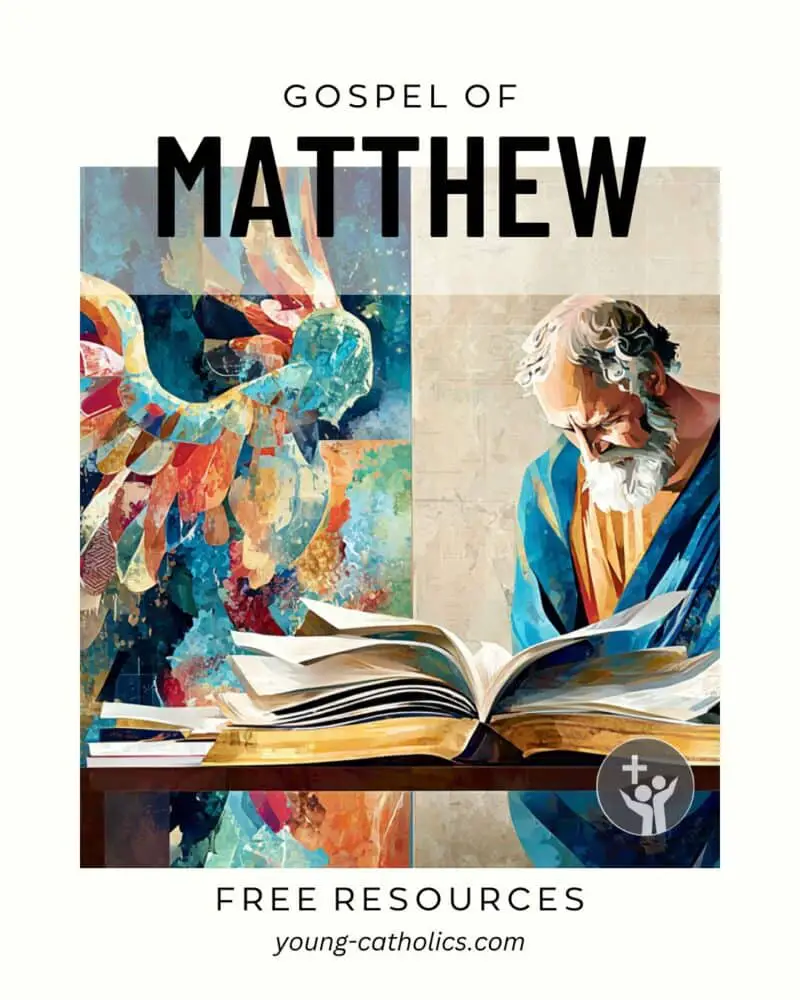
The Gospel of Matthew is the first book in the New Testament. It tells the story of Jesus’ life, death, and resurrection. It was written for a group of Jewish Christians. They believed Jesus was the Messiah promised in the Old Testament.
Matthew wanted to show that Jesus is the Savior. He uses many quotes from the Old Testament. He shows how Jesus fulfills God’s promises. This helped the early Christians understand who Jesus really was.
The book begins with the birth of Jesus. Then it tells about his teachings, miracles, and how he died and rose again. Matthew includes many of Jesus’ words. These words teach us how to live, pray, and treat others.
This Gospel is well loved in the Church. It gives us the Beatitudes, the Lord’s Prayer, and the story of the Last Judgment. Catholics have read and prayed with this book for many centuries. It still speaks to us today.
Who Wrote Matthew and Why It Matters
The Gospel of Matthew was written by Matthew, one of the twelve apostles. He was also called Levi, a tax collector before he followed Jesus. Some think someone else wrote it using Matthew’s teachings. Read more about Saint Matthew, Apostle and Evangelist, here.
It was written around the year 80 or 90 AD. This was after the temple in Jerusalem was destroyed. Many Jews were trying to understand their faith in a hard time. Some had become Christians and were asking, “Was Jesus really the Messiah?”
Matthew’s Gospel tries to answer this question. He shows how Jesus fits into the story of Israel. He connects Jesus to the Old Testament. He wants Jewish Christians to see that following Jesus does not mean leaving their faith. It means seeing it in a new way.
This Gospel was written to help people believe and stay strong. It was also meant to teach. That is why it has so many of Jesus’ words. Matthew wanted his readers to know who Jesus is and how to live as his followers.
How Matthew Tells the Story
Matthew writes in a way that is clear and easy to follow. He organizes the Gospel so we can learn step by step. He groups Jesus’ teachings into five main parts. This reminds us of the five books of Moses in the Old Testament. Here are the five teaching parts:
- Sermon on the Mount – Matthew 5–7
- Mission to the Apostles – Matthew 10
- Parables of the Kingdom – Matthew 13
- Life in the Church – Matthew 18
- The End Times and Judgment – Matthew 23–25
Each section has stories and teachings. First, we see what Jesus does. Then, we hear what he says. This helps us see that Jesus both acts and teaches with power. Matthew also repeats certain words and ideas. This makes it easier to remember.
He likes to say, “This happened to fulfill what the prophet said.” He wants us to see that Jesus did not come out of nowhere. Jesus is part of God’s long plan. This helps Jewish readers feel at home in this new way of faith.
Matthew also uses stories, like parables. These short stories teach lessons about God, people, and how to live. They are simple but deep. They help us think and pray. Many of them are only found in this Gospel.
Big Ideas in Matthew’s Gospel
The Gospel of Matthew teaches many things that are important in the Catholic faith. Some of the main themes include:
- Jesus is the Messiah
Matthew shows that Jesus is the one promised in the Old Testament. He is the Savior God sent for his people. Jesus is the Son of God and the Son of David. - The Kingdom of Heaven
Jesus talks a lot about the Kingdom of Heaven. This is not a place far away. It is where God rules in our hearts and in the world. Jesus calls people to live in this Kingdom now. - Jesus as Teacher
Matthew shows Jesus as a teacher. He gives us the Sermon on the Mount. He teaches the Beatitudes, the Lord’s Prayer, and many parables. These help us know how to live as his followers. - The Church
Matthew is the only Gospel that uses the word “Church.” Jesus gives Peter a special role. He says, “You are Peter, and on this rock I will build my Church.” Catholics see this as the start of the papacy. - Faith and Good Works
Matthew teaches that faith is not just about words. It must be lived out. Jesus says we must feed the hungry, care for the poor, and forgive others. These are ways we show our love for God.
These themes help Catholics know who Jesus is and how to live as his people.
How Matthew’s Gospel Is Put Together
The Gospel of Matthew is carefully organized. It has stories, teachings, and events from Jesus’ life. It is not just a list of events. Matthew arranges it in sections to help us understand and remember.
Here is one simple way to look at the main sections:
- The Birth and Early Life of Jesus (Matthew 1:1–2:23)
This part tells about Jesus’ family line, his birth, and the visit of the wise men. - The Beginning of Jesus’ Ministry (Matthew 3:1–4:25)
John the Baptist appears. Jesus is baptized and tempted. Then he begins to preach and call his first followers. - Jesus’ Teachings and Miracles (Matthew 5:1–9:38)
This includes the Sermon on the Mount (chapters 5–7) and many miracles. - Mission of the Twelve and More Teachings (Matthew 10:1–12:50)
Jesus sends out his twelve apostles and gives them instructions. - Parables and Teachings about the Kingdom (Matthew 13:1–20:34)
Jesus tells many parables. He teaches about how to live and how to treat others. - Jesus Enters Jerusalem and Faces Opposition (Matthew 21:1–25:46)
Jesus enters the city. He teaches in the temple. He warns about the end times and the final judgment. - The Passion, Death, and Resurrection of Jesus (Matthew 26:1–28:20)
This part tells about the Last Supper, Jesus’ suffering, his death on the cross, and his rising from the dead.
These parts help us follow the life of Jesus step by step. Each one shows more about who he is and what he came to do.
Why Matthew Still Matters Today
The Gospel of Matthew is still important for us now. It is not just an old book from long ago. It speaks to our lives today.
Matthew reminds us that Jesus is with us. At the end of the Gospel, Jesus says, “I am with you always” (Matthew 28:20). This gives hope to people who feel alone or afraid.
This Gospel also teaches us how to live. The Beatitudes tell us to be humble, gentle, and kind. The Lord’s Prayer shows us how to talk to God. The parables help us understand what God wants from us.
Matthew also helps us think about the Church. Jesus gives Peter a special role. Catholics see this as the beginning of the pope’s mission. The Church is not just a building. It is people who follow Jesus and live his teachings.
For Catholics today, the Gospel of Matthew is a guide. It helps us trust in Jesus, care for others, and keep going in hard times.
Matthew in the Mass Readings
The Gospel of Matthew is often read at Mass. It is part of the Church’s lectionary. This is the list of Bible readings used during the liturgical year.
Every three years, the Church focuses on one Gospel. Year A is the year of Matthew. During that year, most of the Sunday Gospel readings come from Matthew. We hear many of Jesus’ teachings, like the Beatitudes and the parables.
Matthew is also used on special feast days. For example, the story of the wise men is read on Epiphany. The Passion story from Matthew is read on Palm Sunday during Year A.
Click on a link below to see resources, homilies, and reflections for a specific reading.

Christmas: Vigil Mass
God Keeps His Promises
Matthew 1:1-25 begins with a long list of names. This family line shows that Jesus comes from Abraham and King David. It helps us see that Jesus is part of God’s plan. The list reminds us that God worked through real people, even those who were weak or made mistakes.
Later, Joseph learns that Mary is going to have a baby. He is confused, but an angel tells him that the child is from the Holy Spirit. The angel says the baby will save people from their sins. Joseph listens and obeys. He takes Mary as his wife and names the baby Jesus. This shows Joseph’s faith and trust in God. It also shows how God keeps his promises through ordinary people.

St. Joseph, Husband of Mary
Joseph Says Yes to God
Matthew 1:16, 18-21, 24a tells how Joseph finds out that Mary is going to have a baby. They are engaged but not yet living together. Joseph is a good man and plans to end the engagement quietly to protect her.
An angel comes to him in a dream. The angel tells him not to be afraid and that the child is from the Holy Spirit. The angel also says the baby will save people from their sins. Joseph wakes up and does what God asks. He takes Mary into his home.

4th Sunday of Advent
Joseph Listens to God
Matthew 1:18-24 tells the story of how Joseph finds out that Mary is going to have a baby. They are not yet living together, so he is unsure what to do. He wants to end the engagement quietly to protect her from shame.
Then an angel speaks to Joseph in a dream. The angel tells him that the baby is from the Holy Spirit and that he should not be afraid. The child will save people from their sins. Joseph trusts the message and does what God asks. He takes Mary as his wife and prepares for the birth of Jesus.
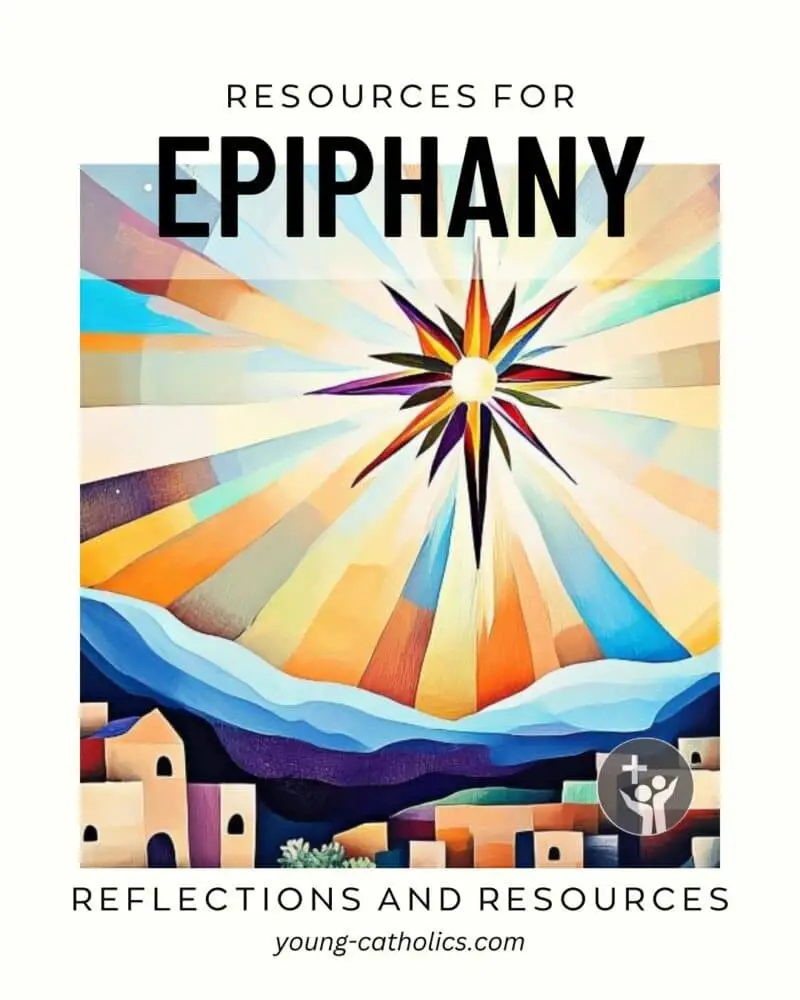
The Epiphany of the Lord
Wise Men Follow the Star
Matthew 2:1-12 tells the story of the wise men who come from the East to find Jesus. They have seen a star and believe it means a new king has been born. They travel to Jerusalem and ask King Herod where to find him. Herod is troubled and calls the priests to learn more.
The priests say the child will be born in Bethlehem. Herod tells the wise men to go find the child and report back, but he has bad plans. The wise men follow the star and find Jesus with Mary. They give him gifts of gold, frankincense, and myrrh. In a dream, they are warned not to return to Herod, so they go home another way.
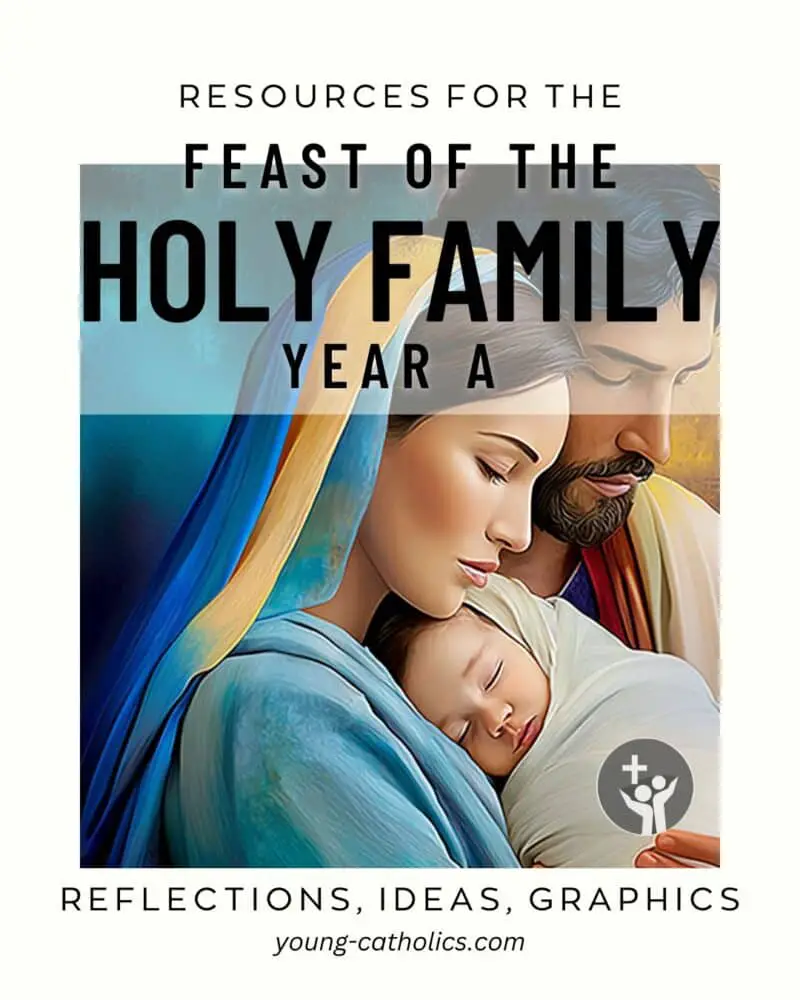
Feast of the Holy Family Year A
God Protects the Holy Family
Matthew 2:13-15, 19-23 tells how Joseph is warned in a dream to take Mary and Jesus to Egypt. King Herod wants to kill the child, so Joseph leaves right away. They stay in Egypt until Herod dies. This keeps Jesus safe, just as God planned.
Later, Joseph is told in another dream that it is safe to return. He takes his family back to Israel. But Herod’s son is now ruling, so Joseph is afraid to go to Judea. He is warned again in a dream and moves to Nazareth instead. This is how Jesus comes to be called a Nazarene.

2nd Sunday of Advent
A Voice in the Desert
Matthew 3:1-12 tells about John the Baptist preaching in the desert. He calls people to turn away from sin and be baptized. Many come to him, confess their sins, and are baptized in the Jordan River. John prepares the way for someone greater who is coming soon.
Some religious leaders come to see him, but John warns them. He says they must truly change, not just follow rules. He tells the people that the one coming after him will bring the Holy Spirit and will judge with fairness. John’s message is strong and clear: be ready, and live the right way.

Baptism of the Lord
Jesus Is Baptized
Matthew 3:13-17 tells how Jesus comes to the Jordan River to be baptized by John. At first, John does not want to do it. He feels unworthy and says that Jesus should baptize him instead. But Jesus says it must be done to follow God’s plan, so John agrees.
After the baptism, something special happens. The sky opens, and the Spirit of God comes down like a dove. A voice from heaven says that Jesus is God’s Son and that he is well pleased. This shows that Jesus is ready to begin his mission.
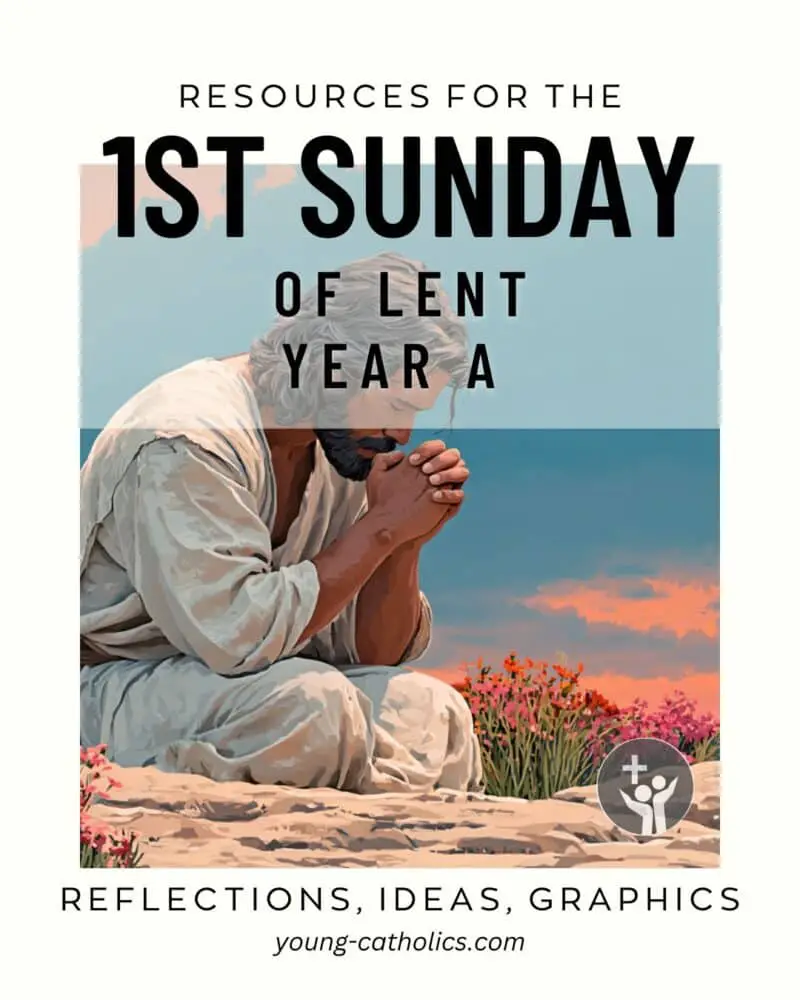
1st Sunday of Lent
Jesus Stands Strong
Matthew 4:1-11 tells how Jesus goes into the desert for forty days. He eats nothing during this time. Then the devil comes to tempt him. He tells Jesus to turn stones into bread, jump from the temple, and worship him for power.
Jesus does not give in. Each time, he answers with words from Scripture. He shows trust in God and refuses to do what is wrong. At the end, the devil leaves, and angels come to care for him. This shows that Jesus is ready to face what is ahead and stay faithful.
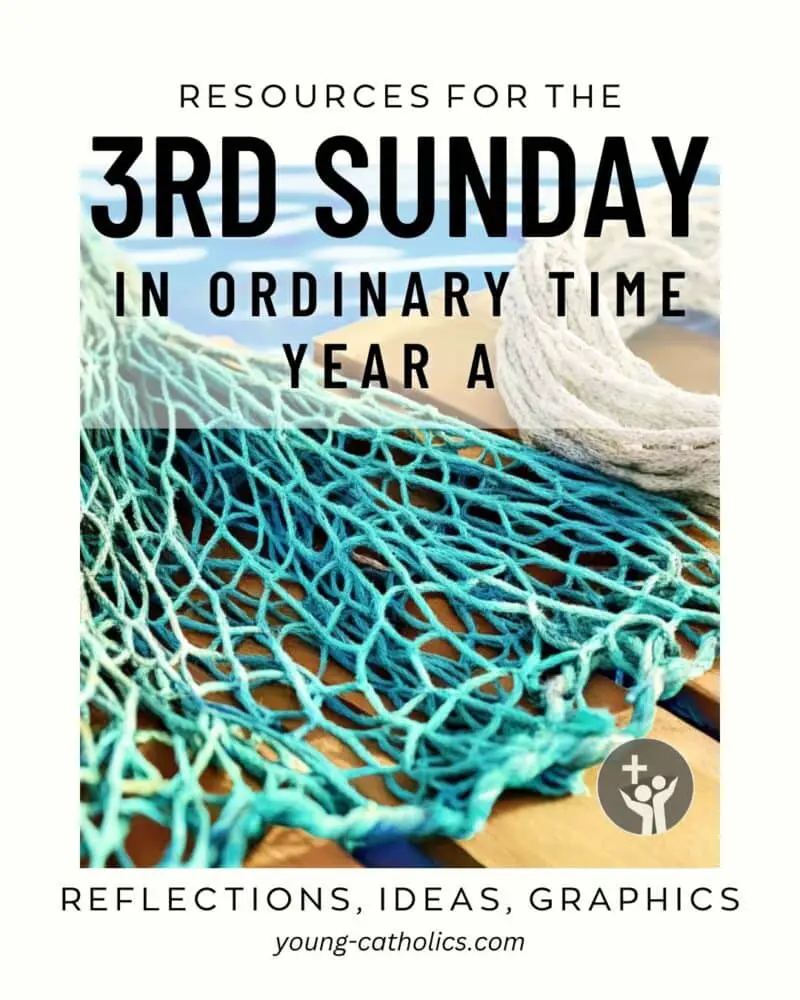
3rd Sunday in Ordinary Time
Jesus Begins His Mission
Matthew 4:12-23 tells how Jesus starts preaching after John the Baptist is arrested. He goes to Galilee and begins to teach in towns near the sea. He tells people to turn back to God because the kingdom of heaven is near.
While walking by the sea, Jesus calls Simon Peter, Andrew, James, and John. They are fishermen, but he invites them to follow him. They leave their boats and go with Jesus right away. Jesus travels through the area, teaching in synagogues, preaching, and healing the sick. His mission has begun.

4th Sunday in Ordinary Time
Blessings for the Faithful
Matthew 5:1-12A shares the beginning of Jesus’ Sermon on the Mount. He sees a large crowd and goes up a hill to teach. He tells the people who are blessed in God’s eyes. These include the poor in spirit, the gentle, those who are sad, and those who seek what is right.
Jesus also blesses those who show mercy, have clean hearts, and work for peace. He says people who are treated badly for doing what is right will be rewarded. These blessings remind us that God sees and cares for those who struggle and stay faithful.
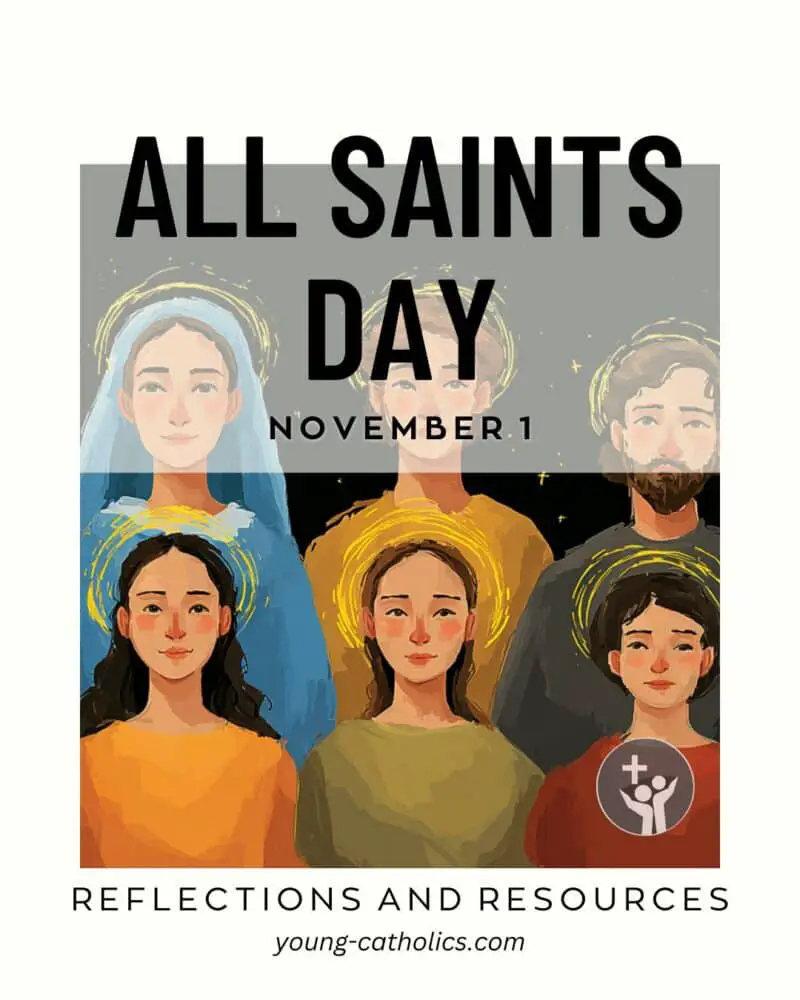
Solemnity of All Saints
The Way of the Saints
Matthew 5:1-12A is also read on All Saints Day. In this reading, Jesus teaches the Beatitudes. He says that people who are humble, kind, and seek what is right are blessed. He also blesses those who suffer, forgive, and bring peace. These are the people who live close to God.
The saints lived this way. They followed Jesus by loving others, staying faithful, and doing what is good even when it was hard. This reading reminds us that anyone can be a saint by living as Jesus taught.

5th Sunday in Ordinary Time
Be a Light to Others
Matthew 5:13-16 shares more of Jesus’ teaching from the Sermon on the Mount. He tells his followers they are like salt and light. Salt gives flavor and keeps food from going bad. Light helps people see in the dark.
Jesus wants his followers to make a difference in the world. He says not to hide their faith. Instead, they should live in a way that shows God’s love. When others see their good actions, they will give glory to God.
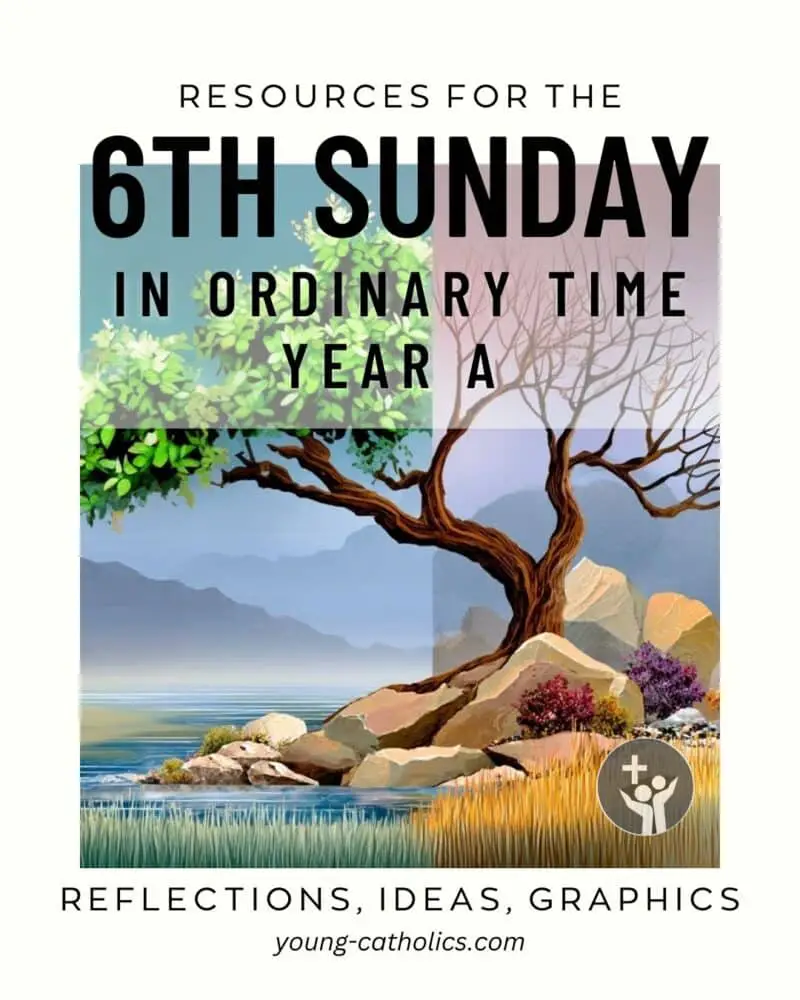
6th Sunday in Ordinary Time
Living God’s Law from the Heart
Matthew 5:17-37 continues Jesus’ teaching on the mountain. He tells the people that he did not come to end the law, but to fulfill it. He wants his followers to go deeper than just following rules. He teaches that being angry, using hurtful words, or holding grudges is also wrong.
Jesus also speaks about marriage, keeping promises, and being honest. He calls people to respect each other and live with care and truth. His teaching shows that what we do and what we think both matter. He invites us to live with love and respect in all things.

7th Sunday in Ordinary Time
Love Beyond Limits
Matthew 5:38-48 continues Jesus’ teaching about love and mercy. He tells the people not to get even with others. Instead of fighting back, he asks them to be kind, even when someone is unkind. He teaches that giving more and going further is better than seeking payback.
Jesus also says to love enemies and pray for them. It is easy to love friends, but he wants his followers to love everyone. This shows that they are truly living as children of God. Jesus calls people to aim higher and to treat others the way God does—with patience and care.

Ash Wednesday
Faith That Stays Quiet
In Matthew 6:1-6, 16-18, Jesus teaches that real faith is not about being seen. He warns against showing off when giving to others, praying, or fasting. People who act for attention already got their reward. That kind of faith is empty.
Jesus tells us to do these things in quiet ways. Help others without drawing notice. Pray where no one sees. Fast without looking sad or trying to impress. God sees what we do in secret. That is what matters. This reading helps us start Lent by focusing on what is real, not what looks good.

8th Sunday in Ordinary Time
Trust in God, Not Worry
Matthew 6:24-34 teaches that we cannot serve both God and money. Jesus tells his followers not to worry about food, clothes, or daily needs. God takes care of the birds and flowers, and he will care for us too.
Jesus reminds us that worry does not help. He says to focus on God’s kingdom and what is right. If we do that, God will provide what we need. He tells us to live one day at a time and not let tomorrow’s problems steal today’s peace.

9th Sunday in Ordinary Time
Build Your Life on Jesus
Matthew 7:21-27 shares Jesus’ warning that not everyone who says they follow him will enter the kingdom of heaven. What matters is doing God’s will, not just saying the right words. Jesus wants people to live out their faith with real actions.
He gives the example of two builders. One builds on rock, the other on sand. The house on rock stands strong in storms. The one on sand falls. This shows that a life built on Jesus and his words will last, even in hard times.

10th Sunday in Ordinary Time
Jesus Calls the Outcasts
Matthew 9:9-13 tells how Jesus calls Matthew, a tax collector, to follow him. Tax collectors were not well liked, but Matthew leaves his work and follows Jesus right away. Later, Jesus eats at Matthew’s house with other tax collectors and sinners.
Some religious leaders complain about this. They ask why Jesus spends time with such people. Jesus tells them that he came to help those who need healing, not those who think they are already good. He reminds them that God wants mercy more than just following rules.
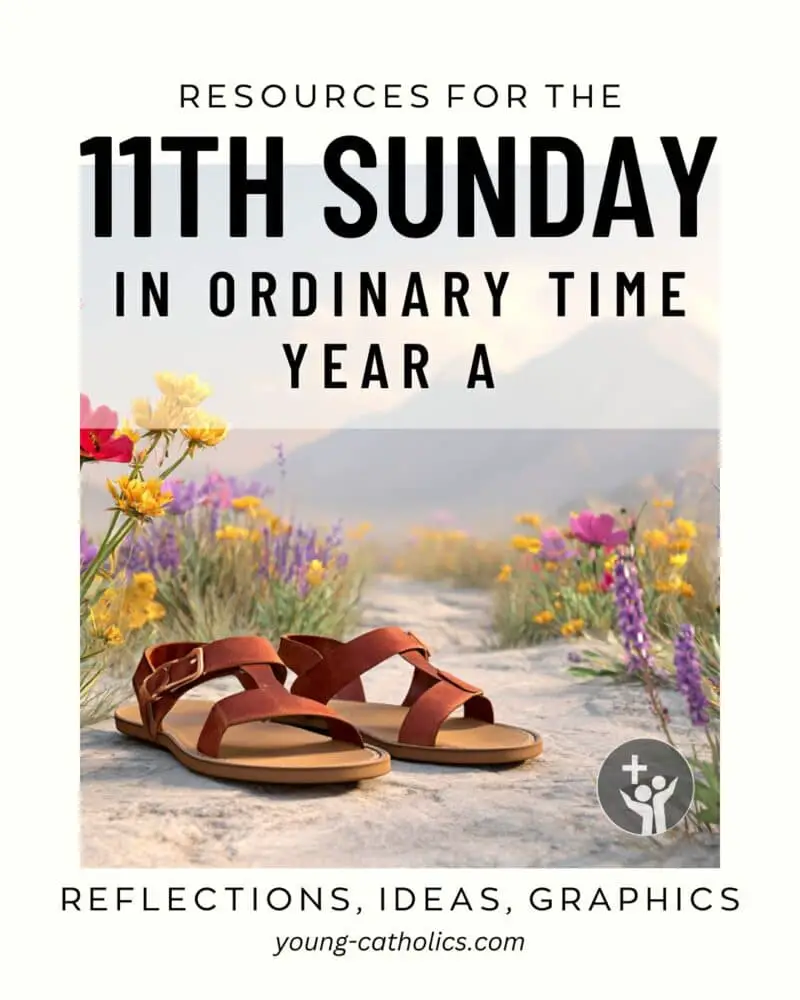
11th Sunday in Ordinary Time
Workers for the Mission
Matthew 9:36–10:8 shows Jesus looking at the crowds with care. He sees that they are lost and in need of help, like sheep without a shepherd. He says there is much work to do, but few workers. So he tells his followers to pray for more people to help.
Jesus then calls twelve of his disciples and sends them out. He gives them power to heal and to drive out unclean spirits. He tells them to go to the lost sheep of Israel and to share the good news. They are to heal the sick, raise the dead, and bring peace to those in need.
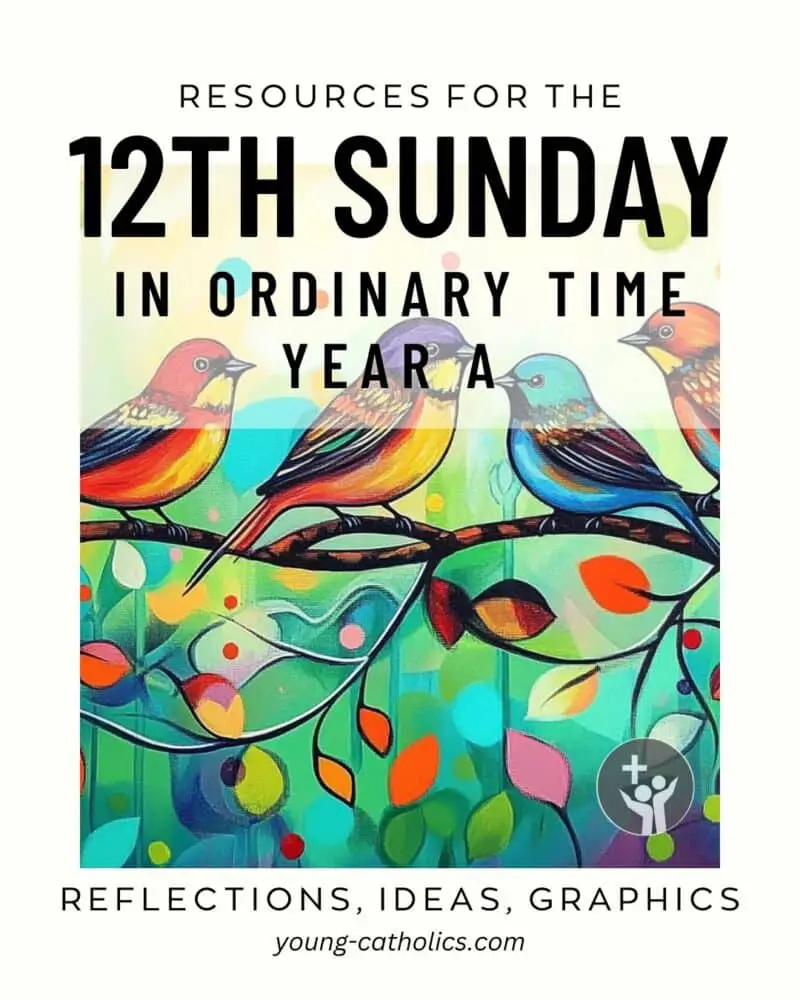
12th Sunday in Ordinary Time
Do Not Be Afraid
Matthew 10:26-33 reminds the disciples not to be afraid. Jesus tells them that everything hidden will be made known. He encourages them to speak openly and share his message with courage.
Jesus also tells them that God cares about each of them. Even the smallest things in life matter to God. He promises that those who stay faithful and speak up for him will be remembered. But those who deny him will not be known before the Father.
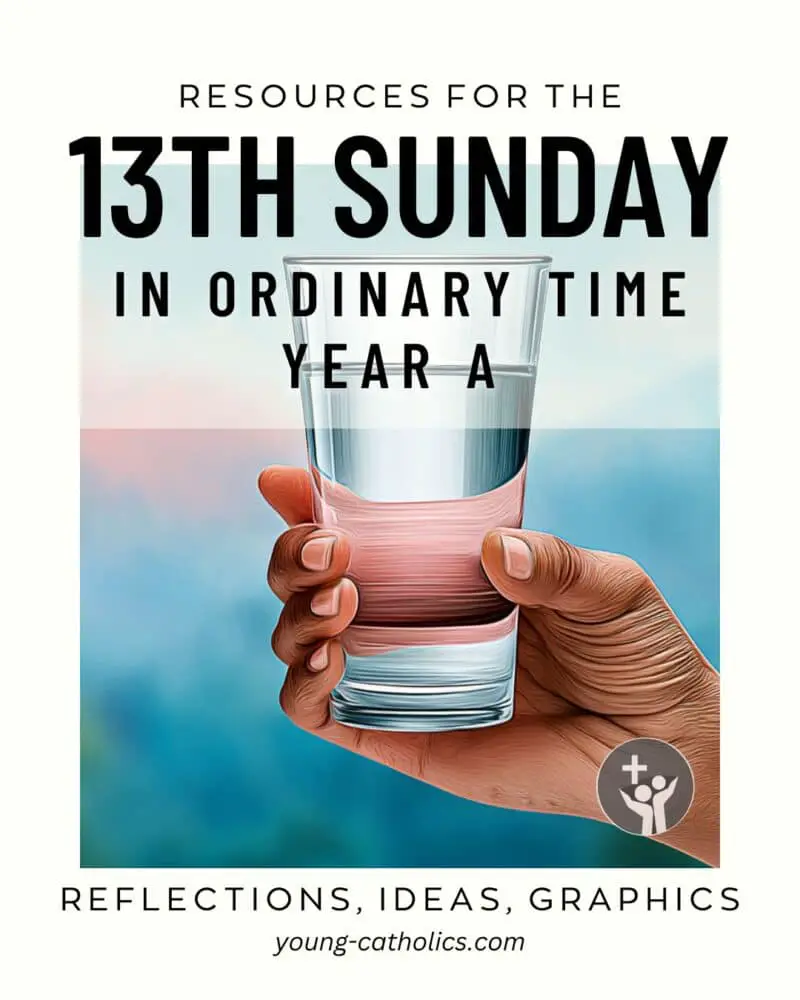
13th Sunday in Ordinary Time
Putting Jesus First
Matthew 10:37-42 teaches that following Jesus must come before everything else. Jesus says that love for him should be greater than love for family or comfort. He calls his followers to take up their cross, meaning to accept the cost of living for him.
Jesus also says that even small acts of kindness matter. Welcoming others, helping a stranger, or giving a simple drink of water in his name will not be forgotten. Every act of love done for others is also done for him.
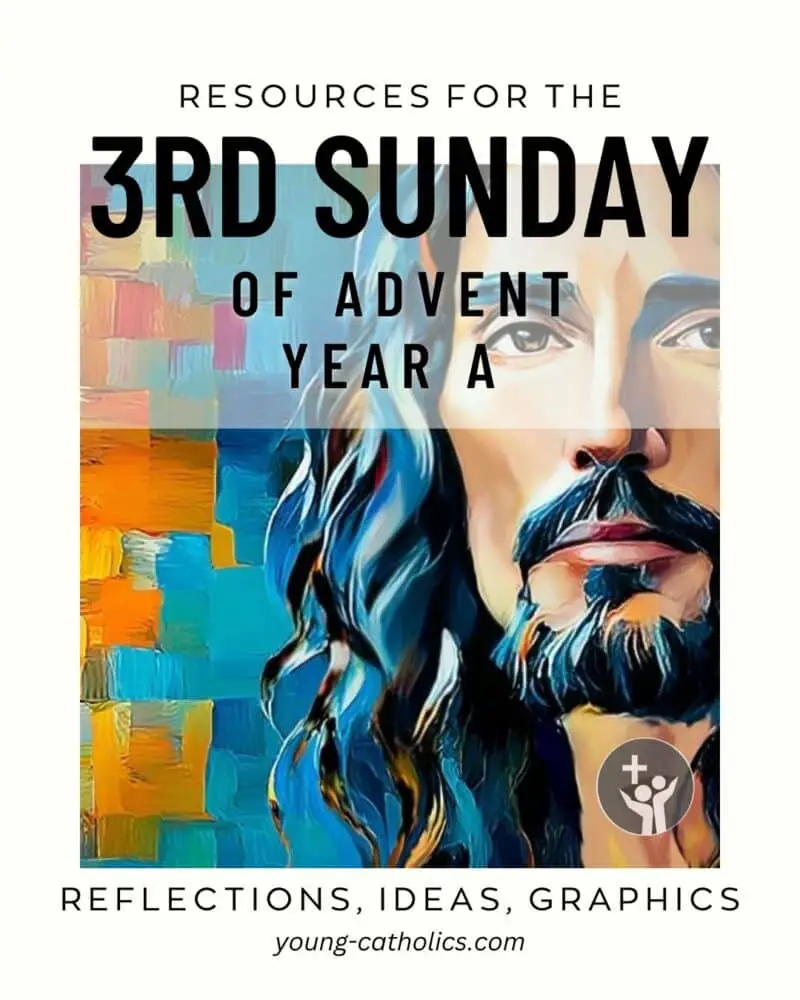
3rd Sunday of Advent
Is Jesus the One?
Matthew 11:2-11 tells how John the Baptist, while in prison, sends his followers to ask Jesus if he is the one they were waiting for. Jesus tells them to report what they see—people are healed, the dead are raised, and the poor hear good news. This shows that Jesus is truly the promised one.
After they leave, Jesus speaks to the crowd about John. He says John is more than just a prophet. John prepared the way for Jesus. Jesus also says that no one born of a woman is greater than John, yet even the least in God’s kingdom is greater still.
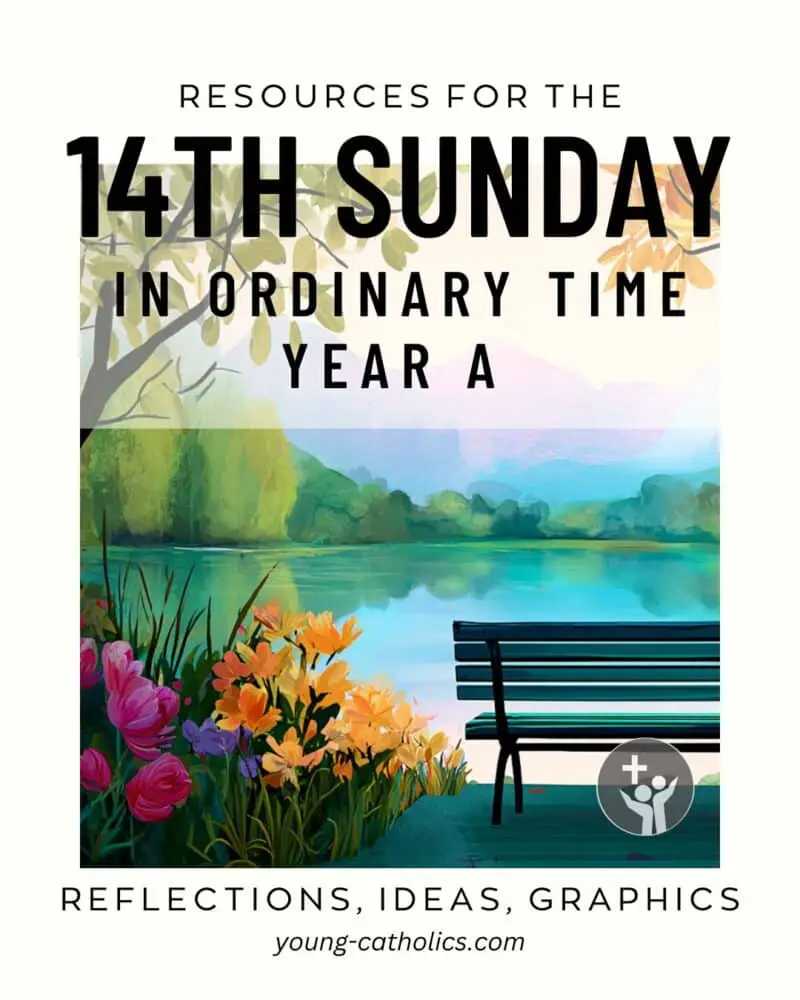
14th Sunday in Ordinary Time
Rest for the Weary
Matthew 11:25-30 shows Jesus thanking the Father for revealing truth to simple people, not just the wise and learned. He says that only he truly knows the Father, and he shares that knowledge with those who follow him.
Jesus then invites people who are tired and burdened to come to him. He promises rest for their souls. He says his way is gentle and not heavy. Jesus asks people to learn from him and trust that his path brings peace.

Solemnity of the Most Sacred Heart of Jesus
The Gentle Heart of Jesus
Matthew 11:25-30 is also read on the Solemnity of the Most Sacred Heart of Jesus. In this reading, Jesus gives thanks that simple and humble people are open to God’s truth. He says that the Father has given him all things, and only he can fully show us who God is.
Jesus invites those who are tired and burdened to come to him. He promises rest and peace. He tells them to learn from him, for he is gentle and kind. His way is not heavy, and those who follow him will find comfort for their souls.
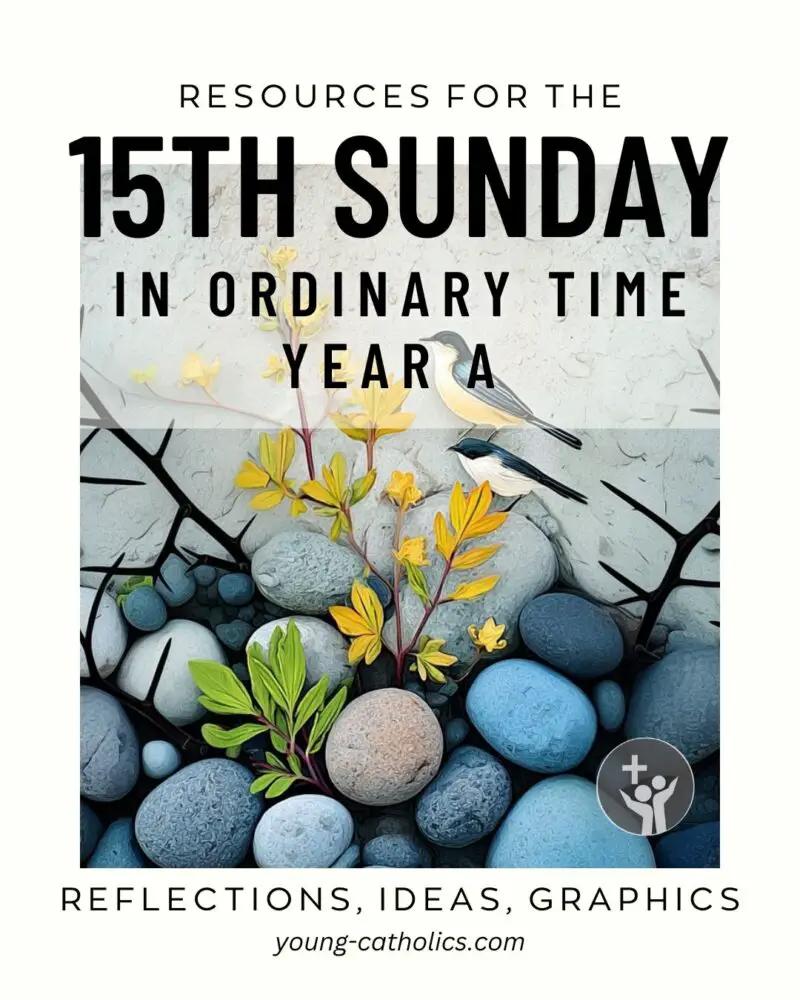
15th Sunday in Ordinary Time
The Seed and the Soil
Matthew 13:1-23 tells the story of a farmer who scatters seeds on different kinds of ground. Some fall on a path, some on rocky ground, some among thorns, and some on good soil. Only the seeds on good soil grow well and produce a full harvest.
Jesus explains that the seed is God’s word. The different soils are like people’s hearts. Some people hear the message but forget it quickly. Others get excited but give up when things get hard. Some let worries or other things take over. But those with open hearts listen, understand, and live by God’s word.
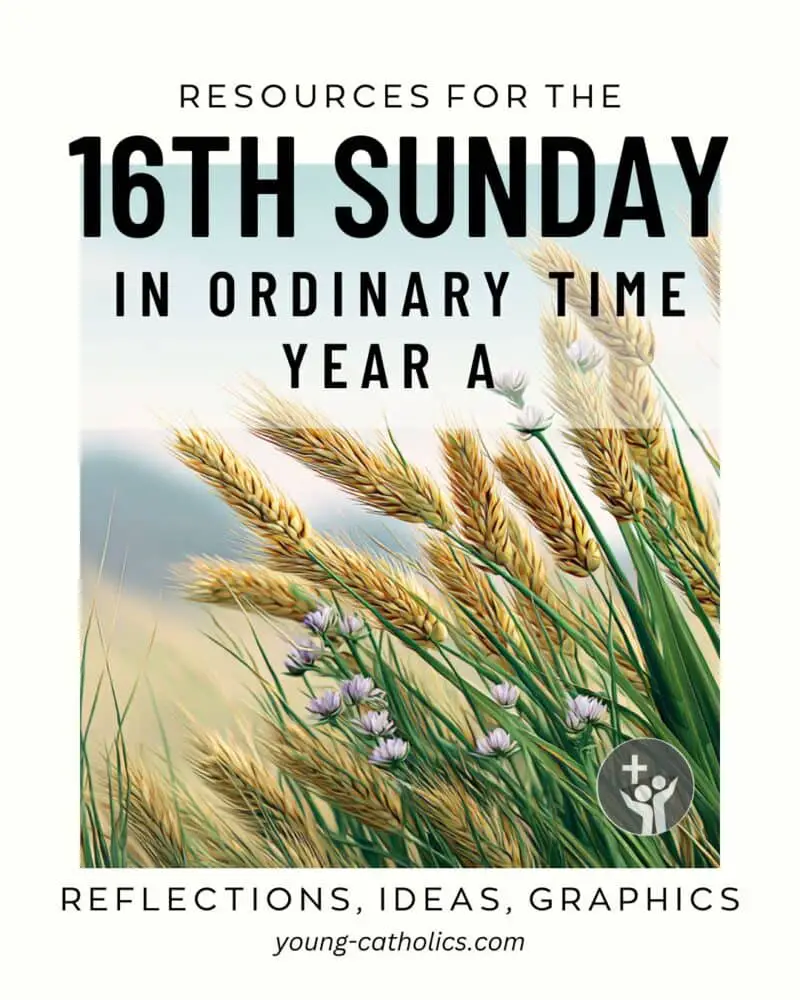
16th Sunday in Ordinary Time
Good and Evil Grow Together
Matthew 13:24-43 shares three parables Jesus tells about God’s kingdom. First, he says the kingdom is like a field where both wheat and weeds grow. The owner lets them grow together until harvest. Then the wheat is kept, and the weeds are burned.
Next, Jesus says the kingdom is like a mustard seed that grows into a large tree and like yeast that makes bread rise. These parables show that God’s kingdom may start small but grows quietly and strong. Jesus explains that the good and bad live side by side now, but God will sort everything out in the end.
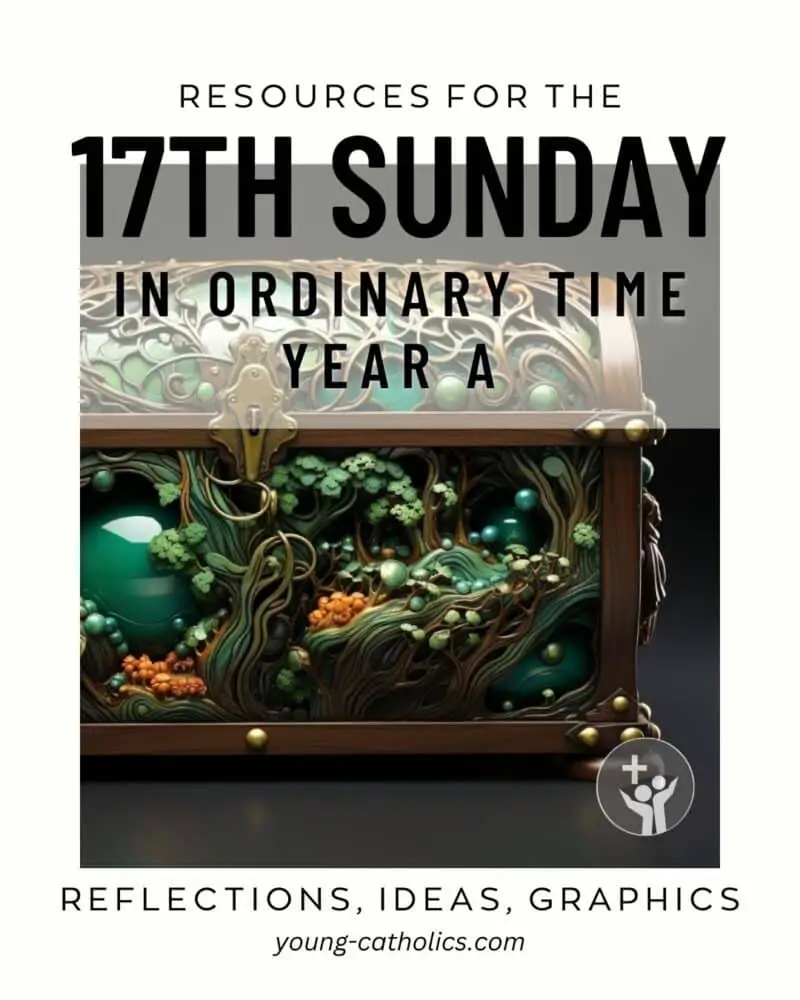
17th Sunday in Ordinary Time
The Treasure of God’s Kingdom
Matthew 13:44-52 shares more parables about the kingdom of heaven. Jesus says it is like a treasure hidden in a field or a pearl of great value. A person gives up everything to gain it. This shows how important the kingdom is—worth more than anything else.
He also says the kingdom is like a net that catches all kinds of fish. At the end, the good are kept, and the bad are thrown out. Jesus adds that those who understand his teachings are like someone who brings out both old and new treasures. These parables teach us to value God’s kingdom above all else.
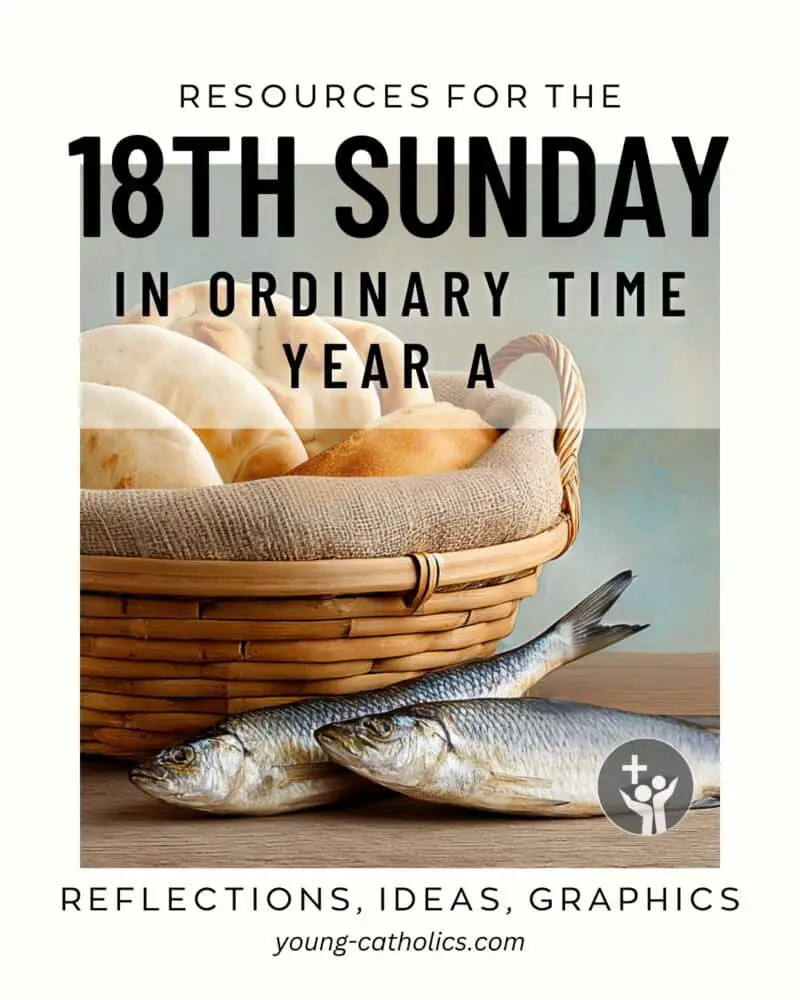
18th Sunday in Ordinary Time
Food for the Crowd
Matthew 14:13-21 tells how Jesus goes to a quiet place, but a large crowd follows him. He sees they are in need and heals the sick. As evening comes, the disciples want to send the people away to find food, but Jesus tells them to feed the crowd.
They only have five loaves of bread and two fish. Jesus blesses the food, and the disciples pass it out. Everyone eats and is full. Afterward, they collect twelve baskets of leftovers. This shows that Jesus cares for both body and spirit and provides more than enough.

19th Sunday in Ordinary Time
Jesus Walks on Water
Matthew 14:22-33 tells how Jesus sends his disciples ahead by boat while he goes to pray alone. During the night, a strong wind hits the lake, and the boat is tossed by the waves. Then Jesus comes toward them, walking on the water.
The disciples are afraid, thinking he is a ghost. Jesus tells them not to be afraid. Peter asks to walk to him on the water. He starts to, but when he sees the wind, he gets scared and begins to sink. Jesus saves him and asks why he doubted. When they get in the boat, the wind stops, and the disciples worship Jesus.
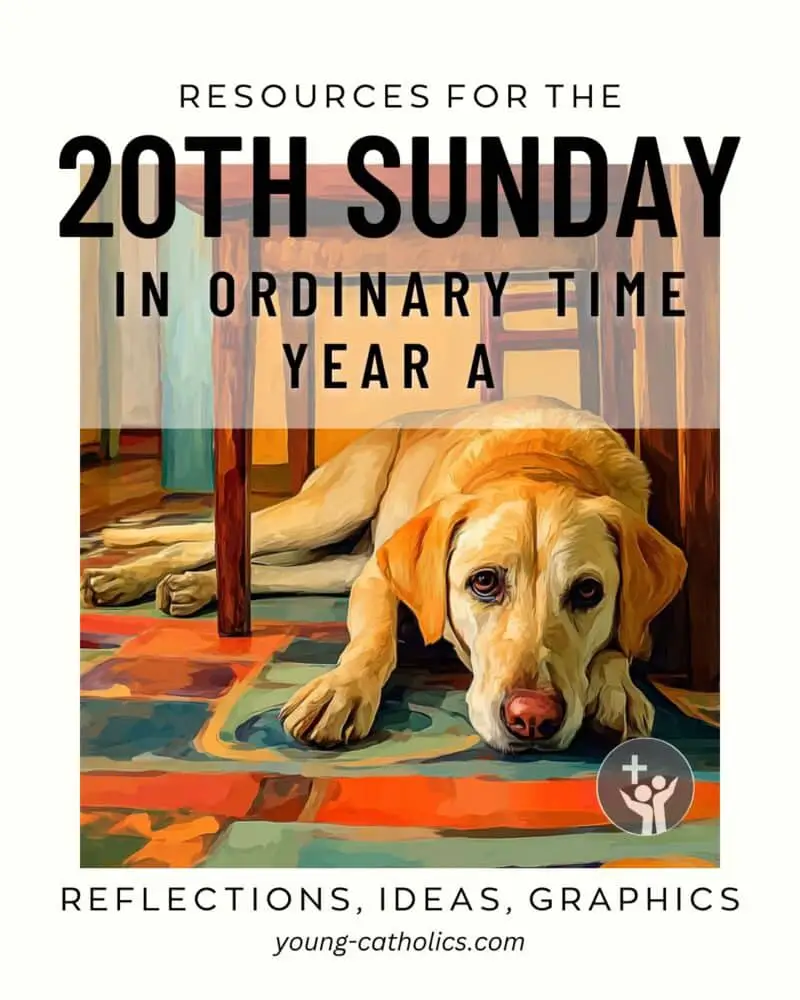
20th Sunday in Ordinary Time
A Mother’s Faith
Matthew 15:21-28 tells the story of a woman from outside Israel who asks Jesus to heal her daughter. At first, Jesus says nothing. The disciples want to send her away. Jesus says his mission is first to the people of Israel.
But the woman does not give up. She shows great faith and keeps asking for help. Jesus sees her trust and heals her daughter. This story shows that faith is not limited by background. God listens to all who come with trust and hope.
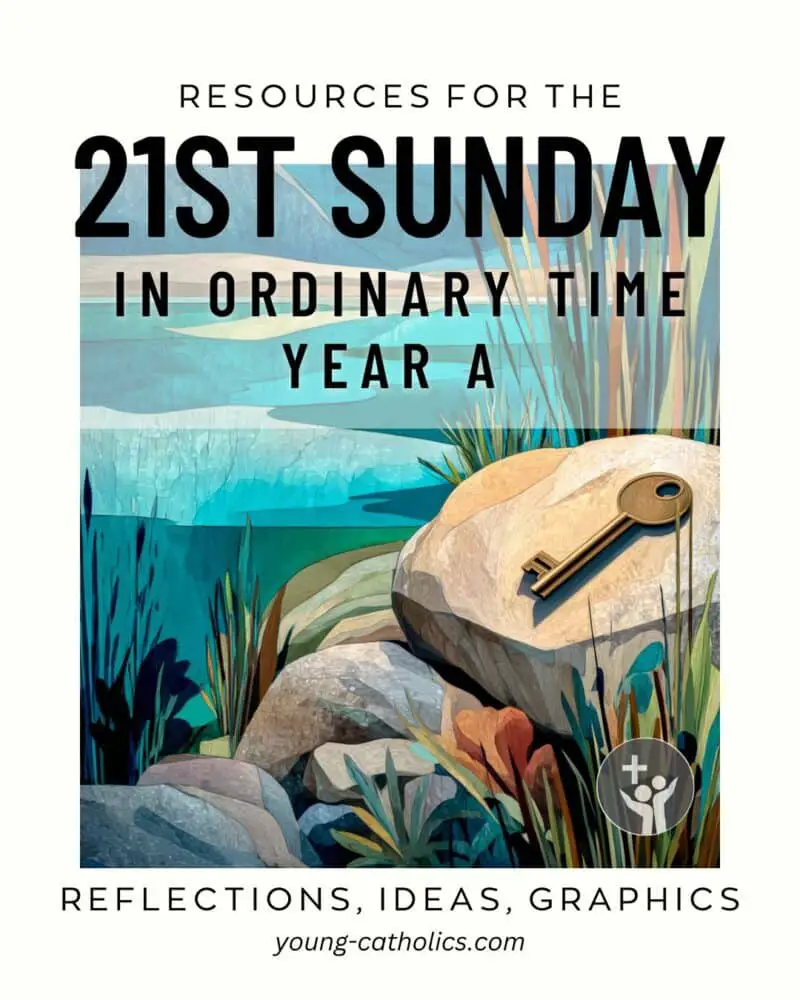
21st Sunday in Ordinary Time
Peter’s Big Answer
Matthew 16:13-20 tells how Jesus asks his disciples who people say he is. They give different answers. Then Jesus asks them directly. Peter speaks up and says that Jesus is the Messiah, the Son of the living God.
Jesus is pleased with Peter’s answer. He says that this truth came from the Father, not from people. Jesus then gives Peter a special mission. He calls Peter the rock and says he will build his Church on him. Jesus also gives him the keys to the kingdom, showing his role as leader.
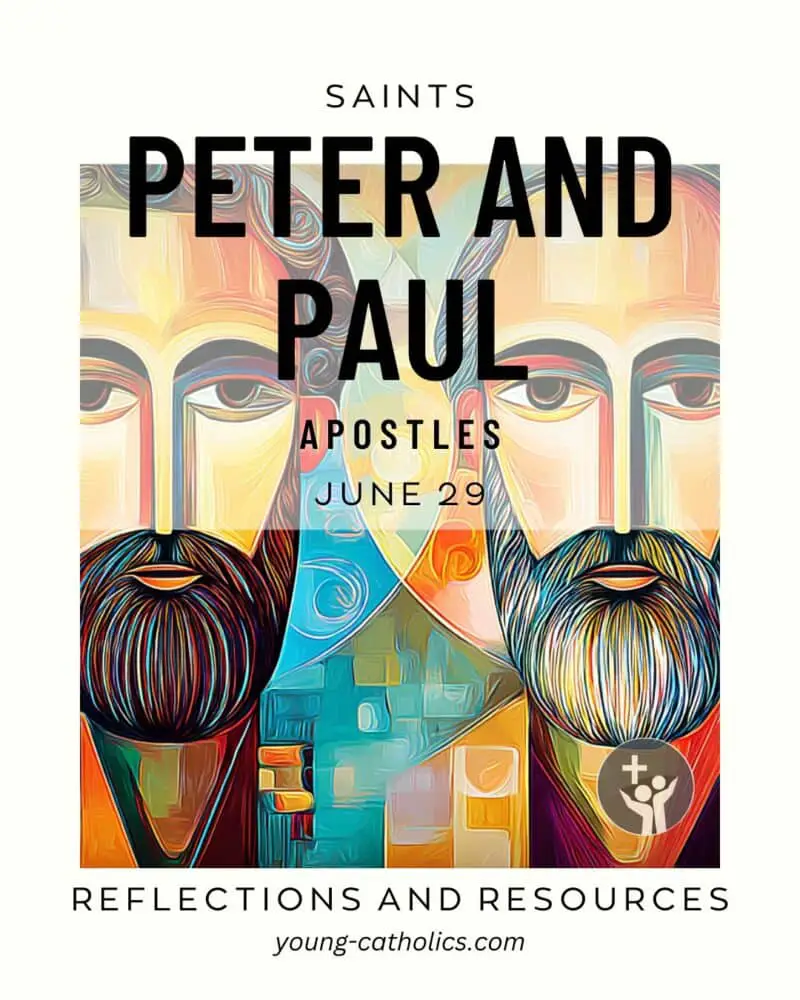
Solemnity of Saints Peter and Paul, Apostles
Peter Says Who Jesus Is
Matthew 16:13-19 is also read on the Feast of Saints Peter and Paul. In this reading, Jesus asks his disciples who people say he is. Then he asks them directly. Peter answers that Jesus is the Messiah, the Son of the living God.
Jesus praises Peter for this answer. He says that this truth was shown to Peter by the Father. Jesus then gives Peter a special role. He says Peter is the rock on which he will build his Church. He also gives Peter the keys to the kingdom of heaven, showing his leadership in the Church.
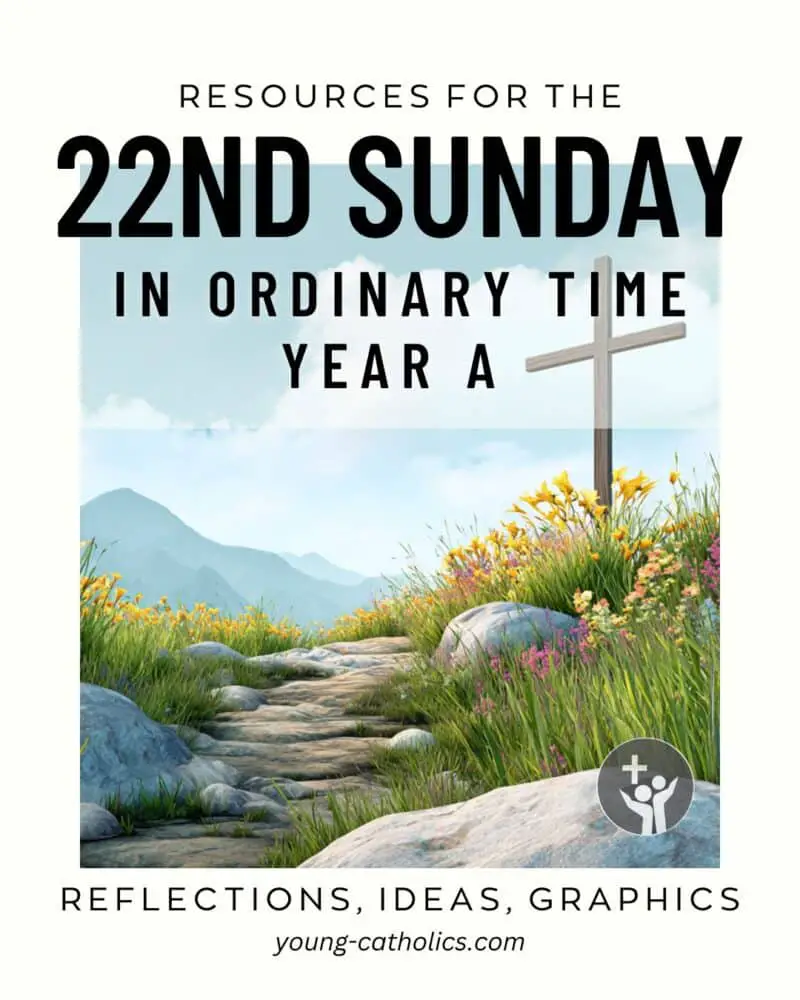
22nd Sunday in Ordinary Time
Following Jesus Isn’t Easy
Matthew 16:21-27 shows Jesus telling his disciples that he must suffer, die, and rise again. Peter does not want this to happen and tries to stop him. But Jesus corrects Peter and says he is thinking like people, not like God.
Jesus then teaches that anyone who wants to follow him must take up their cross. He explains that trying to save your life by avoiding sacrifice will not work. But giving your life for him will lead to real life. He says that the Son of Man will return and reward each person for their actions.
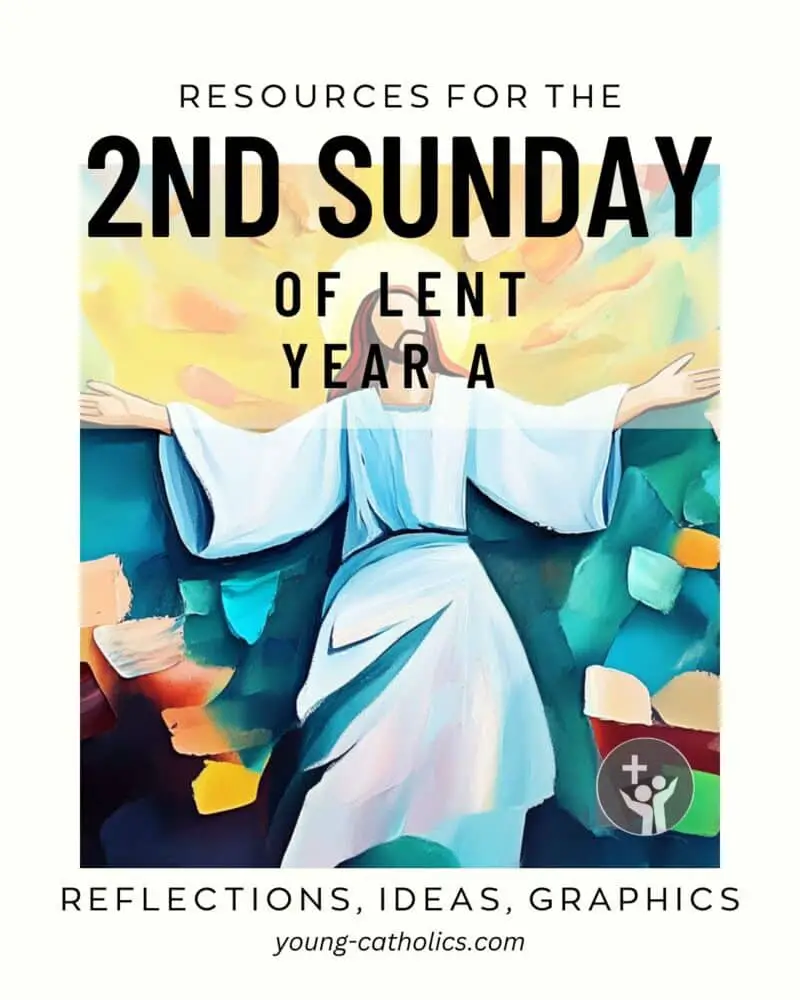
2nd Sunday of Lent
Jesus Shows His Glory
Matthew 17:1-9 tells how Jesus takes Peter, James, and John up a mountain. There, his appearance changes. His face shines, and his clothes become bright. Moses and Elijah appear and talk with him. The disciples are amazed and afraid.
A voice from a cloud says that Jesus is God’s Son and that they should listen to him. The disciples fall down in fear, but Jesus tells them not to be afraid. As they walk down the mountain, he tells them not to talk about what they saw until after he rises from the dead.
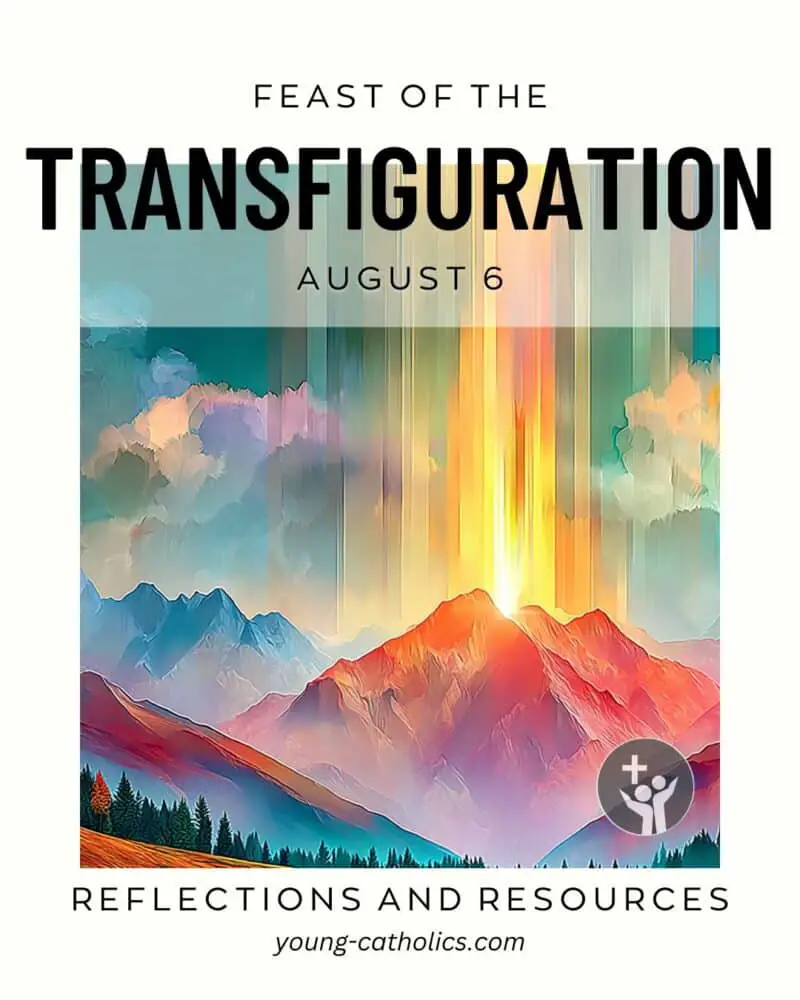
Transfiguration of the Lord
A Glimpse of Glory
Matthew 17:1-9 is also read on the Feast of the Transfiguration of the Lord. Jesus takes Peter, James, and John up a high mountain. There, his face shines and his clothes become bright. Moses and Elijah appear and speak with him. The disciples are amazed and unsure what to do.
Then a cloud covers them, and a voice says that Jesus is God’s Son and that they should listen to him. The disciples fall to the ground in fear, but Jesus tells them not to be afraid. As they come down the mountain, he tells them to keep this event secret until after he rises from the dead.
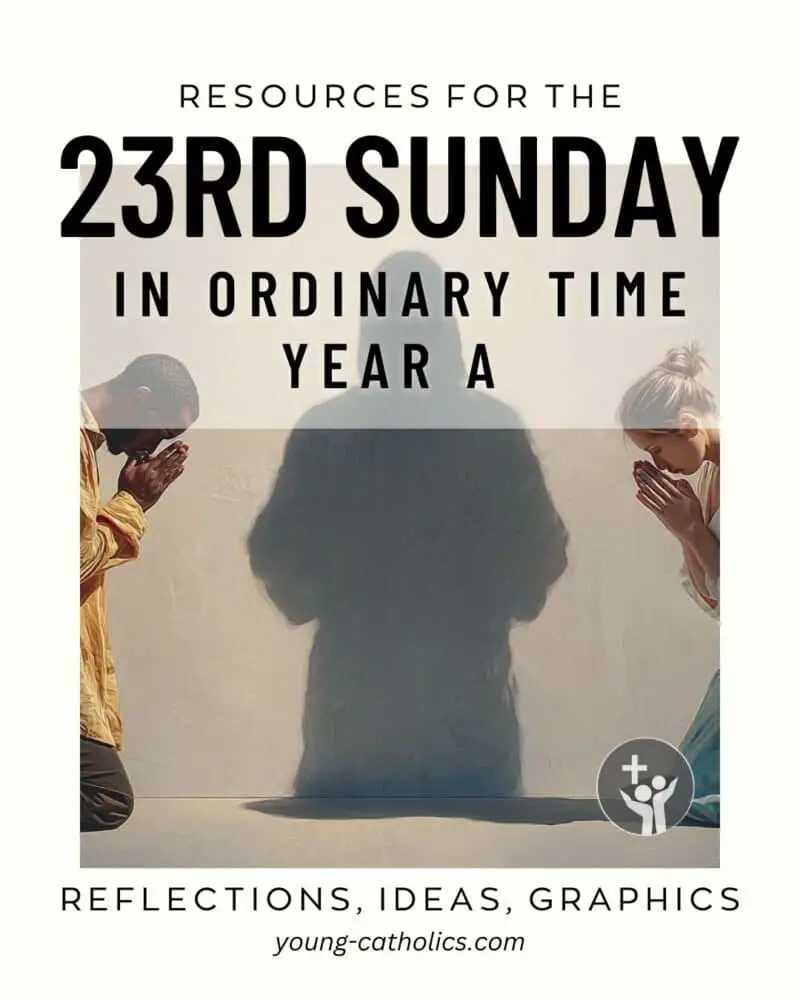
23rd Sunday in Ordinary Time
Handling Problems with Love
Matthew 18:15-20 teaches how to deal with conflict in a kind and fair way. Jesus says if someone does something wrong, talk to them privately first. If they don’t listen, bring one or two others. If that still doesn’t work, take it to the larger group, like the Church.
Jesus also reminds his followers that their actions matter. When they come together in his name, he is with them. He gives the Church the role of helping people make peace and guiding them back to what is right.
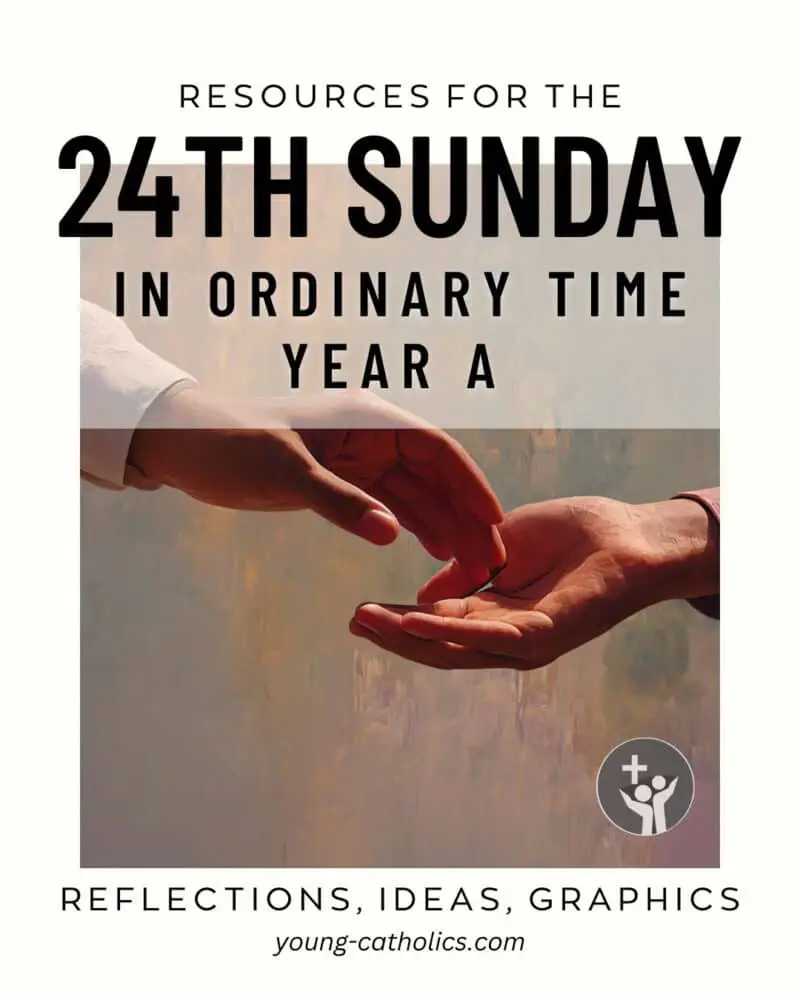
24th Sunday in Ordinary Time
Forgive from the Heart
Matthew 18:21-35 begins with Peter asking how many times he must forgive someone. Jesus answers with a large number, showing that we should always be ready to forgive. He then tells a parable about a servant who is forgiven a great debt by his master.
But that same servant refuses to forgive a small debt owed to him. When the master finds out, he is angry and punishes the servant. Jesus uses this story to teach that God forgives us, and we must forgive others in the same way. True forgiveness should come from the heart.

25th Sunday in Ordinary Time
God’s Fairness Is Different
Matthew 20:1-16A tells a parable about a landowner who hires workers at different times during the day. Some work all day, while others only work a short time. At the end of the day, the landowner pays them all the same wage.
The workers who worked the longest complain. But the landowner reminds them that he paid what was agreed. He chooses to be generous with the others. Jesus uses this story to show that God’s ways are not like ours. God gives freely and treats all with kindness, no matter when they come to him.
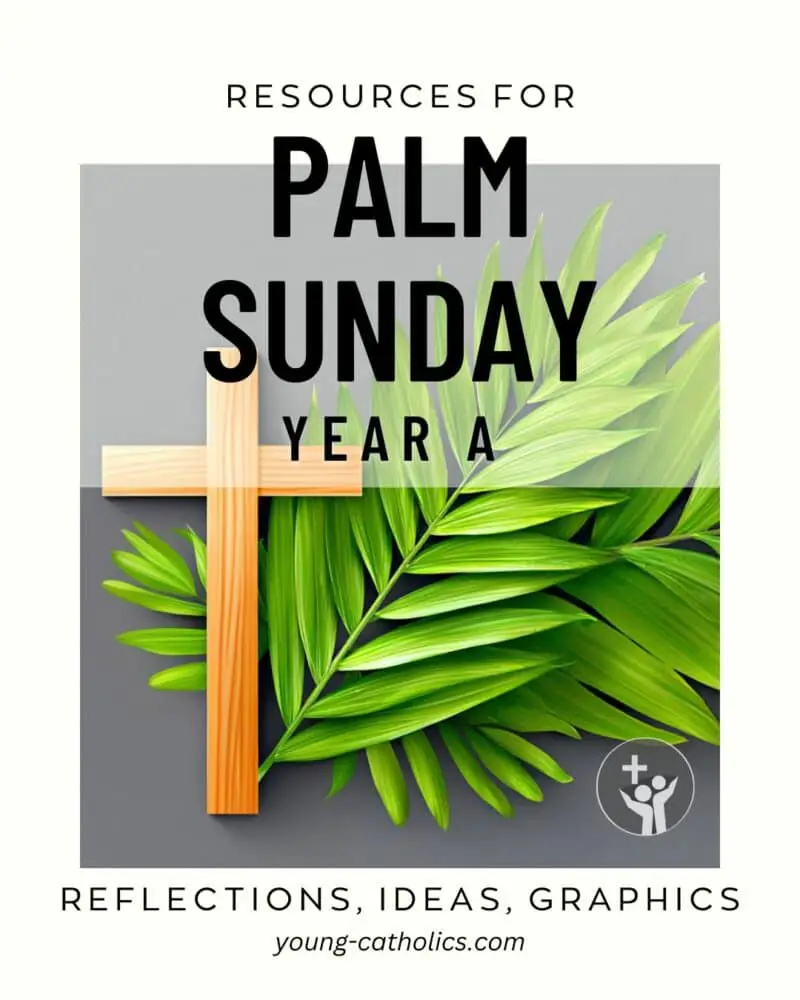
Palm Sunday Procession for Year A
Jesus Enters Jerusalem
Matthew 21:1-11 tells how Jesus enters Jerusalem before Passover. He sends two disciples to get a donkey and a colt. This fulfills what the prophet said about a king coming in peace, riding on a donkey. The disciples bring the animals, and Jesus rides into the city.
A large crowd gathers. People spread their cloaks and branches on the road. They shout with joy and call Jesus a king. The whole city is stirred up, asking who he is. The crowd says he is the prophet Jesus from Nazareth. This moment begins the final part of his mission.

26th Sunday in Ordinary Time
Actions Speak Louder
Matthew 21:28-32 tells a parable about a father who asks his two sons to work in the vineyard. One says no but later goes. The other says yes but never goes. Jesus asks which son did what the father wanted. The answer is the one who went, even after saying no.
Jesus uses this story to show that actions matter more than words. Some people may seem far from God but later change and do what is right. Others may say the right things but do not follow through. God values true obedience and a change of heart.

27th Sunday in Ordinary Time
The Tenants and the Vineyard
Matthew 21:33-43 tells a parable about a landowner who plants a vineyard and rents it to tenants. When he sends servants to collect the fruit, the tenants beat or kill them. He even sends his son, but they kill him too, hoping to take everything for themselves.
Jesus explains that the landowner will remove those tenants and give the vineyard to others. He is speaking about how some leaders rejected God’s messengers and even his Son. The kingdom of God will be given to people who listen and live by his ways.

28th Sunday in Ordinary Time
The Wedding Invitation
Matthew 22:1-14 tells a parable about a king who gives a wedding feast for his son. He invites many people, but they refuse to come. Some ignore the message, and others treat the messengers badly. The king sends more servants to invite anyone they can find, both good and bad.
The banquet is filled, but one guest is not dressed properly. The king has him removed. Jesus uses this story to show that God invites everyone to his kingdom, but we must be ready. It is not enough just to show up—we must also live in a way that honors the invitation.

29th Sunday in Ordinary Time
A Question About Taxes
Matthew 22:15-21 tells how some religious leaders try to trap Jesus with a question. They ask if it is right to pay taxes to the Roman emperor. They hope his answer will get him in trouble with the law or the people.
Jesus asks them to show a coin and points out the emperor’s image on it. He says to give to the emperor what belongs to him, and give to God what belongs to God. This teaches that we must respect both civil duties and our duties to God.

30th Sunday in Ordinary Time
The Greatest Commandments
Matthew 22:34-40 tells how a teacher of the law asks Jesus which commandment is the greatest. Jesus answers simply. He says the first and greatest commandment is to love God with all your heart, soul, and mind.
Then Jesus adds that the second is to love your neighbor as yourself. He explains that all the laws and teachings of the prophets are based on these two commandments. Loving God and others is the foundation of how we are called to live.

31st Sunday in Ordinary Time
Practice What You Teach
Matthew 23:1-12 shows Jesus speaking to the crowds and his disciples about the religious leaders. He says they teach the law of Moses, so people should listen to their words. But he warns not to follow their example, because they do not practice what they preach.
Jesus explains that the leaders want praise and attention. They like to be honored and called important names. But Jesus says the greatest person is the one who serves others. He teaches that those who lift themselves up will be brought low, and those who stay humble will be raised.

1st Sunday of Advent
Be Ready at All Times
Matthew 24:37-44 reminds us to stay alert and ready. Jesus compares his coming to the days of Noah. People were living their normal lives and were not ready when the flood came. In the same way, many will not expect the moment when the Son of Man returns.
Jesus says we do not know the day or hour. He tells us to stay awake and prepared, like someone guarding a house from a thief. The message is clear: live each day with faith, so we are always ready to meet the Lord.

32nd Sunday in Ordinary Time
The Wise and Foolish Bridesmaids
Matthew 25:1-13 tells a parable about ten bridesmaids waiting for a wedding. Five are wise and bring extra oil for their lamps. Five are foolish and bring none. When the bridegroom is late, all of them fall asleep.
At midnight, the call comes that the bridegroom is arriving. The wise bridesmaids are ready and go into the feast. The foolish ones run to buy more oil but return too late. The door is shut, and they are not let in. Jesus teaches us to stay ready, because we do not know the day or hour.

33rd Sunday in Ordinary Time
Using What God Gives
Matthew 25:14-30 tells a parable about a man who goes on a trip and gives his servants money to take care of. Two of the servants use the money well and double what they were given. The master is pleased and rewards them.
But one servant hides the money and does nothing with it. When the master returns, he is upset. He takes the money from that servant and gives it to one who used it well. Jesus teaches that we should use the gifts and chances God gives us. If we do nothing, we lose what we have.

Solemnity of Christ the King
The Final Judgment
Matthew 25:31-46 describes Jesus speaking about the final judgment. He says the Son of Man will come in glory and separate people like a shepherd separates sheep from goats. The ones on his right are those who helped others—they fed the hungry, welcomed strangers, and cared for the sick.
Jesus says that when they did these things for others, they did them for him. Those on his left did not help others and are sent away. This reading teaches that how we treat people in need matters. Loving others is part of loving God.

Palm Sunday Year A
The Passion of Jesus
Matthew 26:14 – 27:66 tells the story of Jesus’ suffering and death. Judas agrees to betray Jesus for money. Jesus eats the Last Supper with his disciples and tells them that one will betray him. Later, in the garden, Jesus prays while the others fall asleep. Judas arrives and hands him over.
Jesus is taken to the high priest and then to Pilate. Though innocent, he is sentenced to death. He is beaten, mocked, and nailed to a cross. Jesus dies and is buried in a tomb. This reading shows the pain Jesus went through and how people turned against him. Yet even in suffering, he stays faithful to God’s plan.
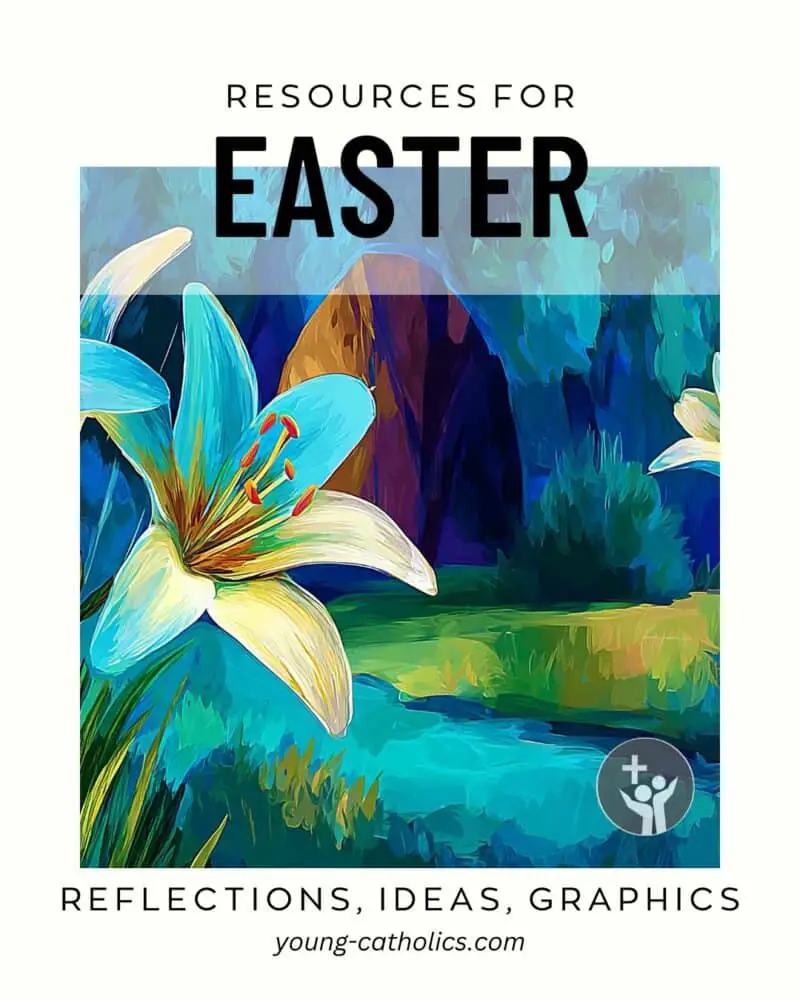
Easter Vigil
He Is Risen
Matthew 28:1-10 tells how two women go to Jesus’ tomb after the Sabbath. There is a great earthquake, and an angel comes down. The angel rolls back the stone and tells the women that Jesus is not there. He has risen from the dead.
The women are filled with both fear and joy. They run to tell the disciples. On the way, Jesus meets them. They fall before him, and he tells them not to be afraid. He tells them to go and share the good news with his followers.
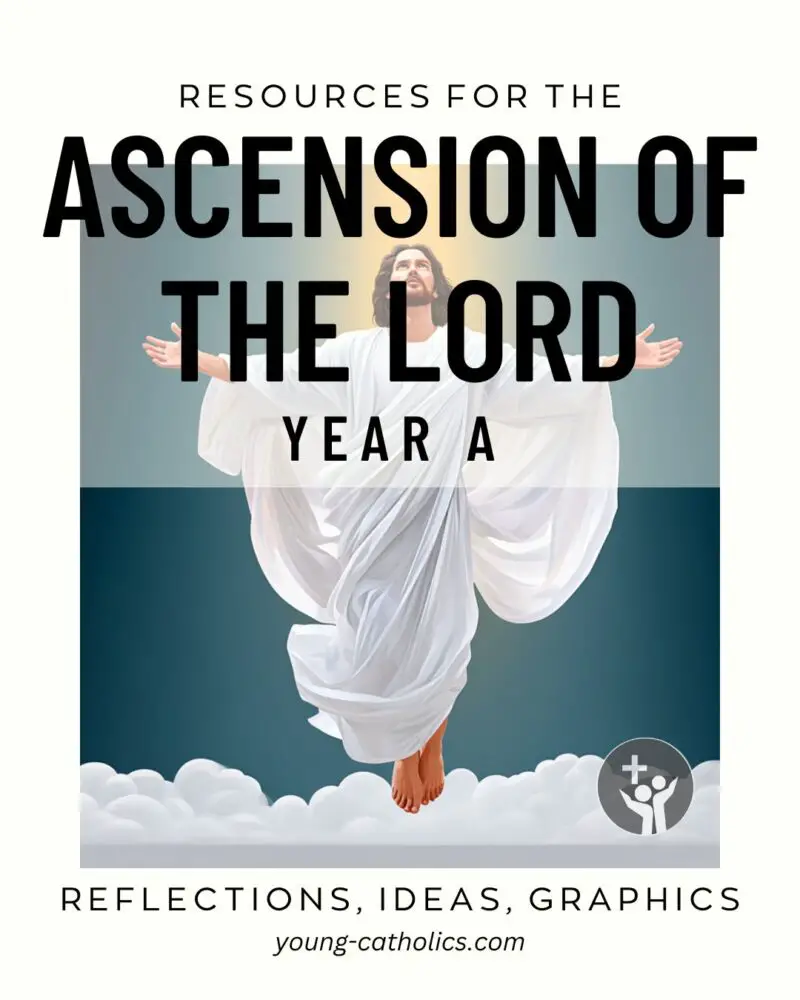
Ascension of the Lord
Go and Make Disciples
Matthew 28:16-20 tells how the eleven disciples go to a mountain in Galilee where Jesus told them to meet him. When they see him, some worship, but some still have doubts. Jesus comes close and speaks to them.
He tells them that all power in heaven and on earth has been given to him. He sends them out to make disciples of all nations. They are to baptize and teach everything he has commanded. Jesus promises to be with them always, until the end of time.
In Weekday Readings
- Nativity of the Blessed Virgin Mary – Matthew 1:1-16, 18-23: The Lineage and Birth of Jesus
- Advent Weekday on December 17 – Matthew 1:1-17: The Genealogy of Jesus Christ
- Advent Weekday on December 18 – Matthew 1:18-25: Jesus’ Birth Foretold
- Feast of the Holy Innocents – Matthew 2:13-18: Herod’s Slaughter of the Innocents
- Monday after Epiphany – Matthew 4:12-17, 23-25: Jesus Begins His Ministry in Galilee
- Feast of Saint Andrew, Apostle – Matthew 4:18-22: Jesus Calls His First Disciples
- Monday of the 10th Week in Ordinary Time Cycle 1 or Cycle 2 – Matthew 5:1-12: The Blessings of the Kingdom
- Tuesday of the 10th Week in Ordinary Time Cycle 1 or Cycle 2 – Matthew 5:13-16: Be Salt and Light
- Wednesday of the 3rd Week of Lent – Matthew 5:17-19: Fulfillment of the Law
- Wednesday of the 10th Week in Ordinary Time Cycle 1 or Cycle 2 – Matthew 5:17-19: Fulfillment of the Law
- Friday of the 1st Week of Lent – Matthew 5:20-26: Righteousness Beyond the Law
- Thursday of the 10th Week in Ordinary Time Cycle 1 or Cycle 2 – Matthew 5:20-26: True Righteousness
- Friday of the 10th Week in Ordinary Time Cycle 1 or Cycle 2 – Matthew 5:27-32: Teachings on Adultery and Divorce
- Saturday of the 10th Week in Ordinary Time Cycle 1 or Cycle 2 – Matthew 5:33-37: True Integrity
- Monday of the 11th Week in Ordinary Time Cycle 1 or Cycle 2 – Matthew 5:38-42: Teachings on Retaliation
- Saturday of the 1st Week of Lent– Matthew 5:43-48: Love Beyond Boundaries
- Tuesday of the 11th Week in Ordinary Time Cycle 1 or Cycle 2 – Matthew 5:43-48: Love Your Enemies
- Wednesday of the 11th Week in Ordinary Time Cycle 1 or Cycle 2 – Matthew 6:1-6, 16-18: Sincere Righteousness
- Friday of the 11th Week in Ordinary Time Cycle 1 or Cycle 2 – Matthew 6:19-23: Treasures in Heaven
- Saturday of the 11th Week in Ordinary Time Cycle 1 or Cycle 2 – Matthew 6:24-34: Trust in God’s Care
- Tuesday of the 1st Week of Lent – Matthew 6:7-15: Teaching on Prayer
- Thursday of the 11th Week in Ordinary Time Cycle 1 or Cycle 2 – Matthew 6:7-15: The Lord’s Prayer and Forgiveness
- Monday of the 12th Week in Ordinary Time Cycle 1 or Cycle 2 – Matthew 7:1-5: Remove Your Own Plank
- Tuesday of the 12th Week in Ordinary Time Cycle 1 or Cycle 2 – Matthew 7:6, 12-14: The Narrow Path to Life
- Thursday of the 1st Week of Lent – Matthew 7:7-12: Ask and You Will Receive
- Wednesday of the 12th Week in Ordinary Time Cycle 1 or Cycle 2 – Matthew 7:15-20: Recognizing False Prophets
- Thursday of the 1st Week of Advent – Matthew 7:21, 24-27: Foundations of Faith
- Thursday of the 12th Week in Ordinary Time Cycle 1 or Cycle 2 – Matthew 7:21-29: Building on a Solid Foundation
- Friday of the 12th Week in Ordinary Time Cycle 1 or Cycle 2 – Matthew 8:1-4: Jesus Heals a Leper
- Monday of the 1st Week of Advent – Matthew 8:5-11: Centurion’s Great Faith
- Saturday of the 12th Week in Ordinary Time Cycle 1 or Cycle 2 – Matthew 8:5-17: Healing in Capernaum
- Monday of the 13th Week in Ordinary Time Cycle 1 or Cycle 2 – Matthew 8:18-22: Following Jesus
- Tuesday of the 13th Week in Ordinary Time Cycle 1 or Cycle 2 – Matthew 8:23-27: Jesus Calms the Storm
- Wednesday of the 13th Week in Ordinary Time Cycle 1 or Cycle 2 – Matthew 8:28-34: Jesus Heals Two Men with Demons
- Thursday of the 13th Week in Ordinary Time Cycle 1 or Cycle 2 – Matthew 9:1-8: Jesus Heals a Paralytic
- Friday of the 13th Week in Ordinary Time Cycle 1 or Cycle 2 – Matthew 9:9-13: Jesus Calls Matthew
- Saint Matthew, Apostle and Evangelist – Matthew 9:9-13: Jesus Calls Matthew
- Friday after Ash Wednesday – Matthew 9:14-15: The Question of Fasting
- Saturday of the 13th Week in Ordinary Time Cycle 1 or Cycle 2 – Matthew 9:14-17: Jesus on Fasting
- Monday of the 14th Week in Ordinary Time Cycle 1 or Cycle 2 – Matthew 9:18-26: Jesus Heals and Revives
- Friday of the 1st Week of Advent – Matthew 9:27-31: Healing of Two Blind Men
- Tuesday of the 14th Week in Ordinary Time Cycle 1 or Cycle 2 – Matthew 9:32-38: Jesus Heals and Sends Workers
- Saturday of the 1st Week of Advent – Matthew 9:35–10:1, 5a, 6-8: Sending the Twelve
- Wednesday of the 14th Week in Ordinary Time Cycle 1 or Cycle 2 – Matthew 10:1-7: Jesus Sends Out the Twelve
- St. Barnabas, Apostle – Matthew 10:7-13: Proclaim the Kingdom and Give Freely
- Thursday of the 14th Week in Ordinary Time Cycle 1 or Cycle 2 – Matthew 10:7-15: Instructions for the Apostles
- Friday of the 14th Week in Ordinary Time Cycle 1 or Cycle 2 – Matthew 10:16-23: Sending the Apostles
- St. Stephen, the First Martyr – Matthew 10:17-22: Stay Strong in Faith
- Saturday of the 14th Week in Ordinary Time Cycle 1 or Cycle 2 – Matthew 10:24-33: Do Not Be Afraid
- Thursday of the 2nd Week of Advent – Matthew 11:11-15: Greatness of John the Baptist
- Friday of the 2nd Week of Advent – Matthew 11:16-19: Unheeded Messages
- Monday of the 15th Week in Ordinary Time Cycle 1 or Cycle 2 – Matthew 10:34-11:1: Division and Commitment
- Tuesday of the 15th Week in Ordinary Time Cycle 1 or Cycle 2 – Matthew 11:20-24: Jesus Rebukes Unrepentant Towns
- Wednesday of the 15th Week in Ordinary Time Cycle 1 or Cycle 2 – Matthew 11:25-27: Praise to the Father
- Wednesday of the 2nd Week of Advent – Matthew 11:28-30: Invitation to Rest
- Thursday of the 15th Week in Ordinary Time Cycle 1 or Cycle 2 – Matthew 11:28-30: Invitation to Rest
- Friday of the 15th Week in Ordinary Time Cycle 1 or Cycle 2 – Matthew 12:1-8: Lord of the Sabbath
- Saturday of the 15th Week in Ordinary Time Cycle 1 or Cycle 2 – Matthew 12:14-21: The Chosen Servant
- Monday of the 16th Week in Ordinary Time Cycle 1 or Cycle 2 – Matthew 12:38-42: The Sign of Jonah
- Tuesday of the 16th Week in Ordinary Time Cycle 1 or Cycle 2 – Matthew 12:46-50: True Family in Christ
- Wednesday of the 16th Week in Ordinary Time Cycle 1 or Cycle 2 – Matthew 13:1-9: Parable of the Sower
- Thursday of the 16th Week in Ordinary Time Cycle 1 or Cycle 2 – Matthew 13:10-17: The Purpose of Parables
- Saints Joachim and Anne – Matthew 13:16-17: Blessed Are You Who See and Hear
- Friday of the 16th Week in Ordinary Time Cycle 1 or Cycle 2 – Matthew 13:18-23: The Parable of the Sower
- Saturday of the 16th Week in Ordinary Time Cycle 1 or Cycle 2 – Matthew 13:24-30: The Parable of the Weeds Among the Wheat
- Monday of the 17th Week in Ordinary Time Cycle 1 or Cycle 2 – Matthew 13:31-35: Parables of the Mustard Seed and Yeast
- Tuesday of the 17th Week in Ordinary Time Cycle 1 or Cycle 2 – Matthew 13:36-43: The Meaning of the Weeds Parable
- Wednesday of the 17th Week in Ordinary Time Cycle 1 or Cycle 2 – Matthew 13:44-46: Parables of Hidden Treasure and Precious Pearl
- Thursday of the 17th Week in Ordinary Time Cycle 1 or Cycle 2 – Matthew 13:47-53: The Kingdom of Heaven and the Net
- Friday of the 17th Week in Ordinary Time Cycle 1 or Cycle 2 – Matthew 13:54-58: Jesus Rejected in His Hometown
- Saint Joseph the Worker – Matthew 13:54-58: Rejected in His Hometown
- Saturday of the 17th Week in Ordinary Time Cycle 1 or Cycle 2 – Matthew 14:1-12: Herod and the Fate of John the Baptist
- Monday of the 18th Week in Ordinary Time Cycle 1 or Cycle 2 – Matthew 14:13-21: The Feeding of the Five Thousand
- Dedication of the Basilicas of Sts. Peter and Paul – Matthew 14:22-33: Jesus Walks on the Water
- Tuesday of the 18th Week in Ordinary Time Cycle 1 or Cycle 2 – Matthew 14:22-36: Jesus Walks on Water and Calms the Storm
- Monday of the 18th Week in Ordinary Time Year A Cycle 1 or Cycle 2 – Matthew 14:22-36: He Walked on the Water
- Tuesday of the 18th Week in Ordinary Time Year A Cycle 1 or Cycle 2 – Matthew 15:1-2, 10-14: What Comes From the Heart
- Wednesday of the 18th Week in Ordinary Time Cycle 1 or Cycle 2 – Matthew 15:21-28: Jesus and the Canaanite Woman
- Wednesday of the 1st Week of Advent – Matthew 15:29-37: The Feeding of the Crowd
- Chair of Saint Peter – Matthew 16:13-19: Peter’s Declaration
- Solemnity of Saints Peter and Paul – Matthew 16:13-19: Peter’s Confession of Christ
- Thursday of the 18th Week in Ordinary Time Cycle 1 or Cycle 2 – Matthew 16:13-23: Peter Confesses Jesus as the Christ
- Friday of the 18th Week in Ordinary Time Cycle 1 or Cycle 2 – Matthew 16:24-28: Following Jesus
- Transfiguration of the Lord – Matthew 17:1-9: The Transfiguration of Jesus
- Saturday of the 2nd Week of Advent – Matthew 17:9a, 10-13: Elijah’s Coming Explained
- Saturday of the 18th Week in Ordinary Time Cycle 1 or Cycle 2 – Matthew 17:14-20: Faith as Small as a Mustard Seed
- Monday of the 19th Week in Ordinary Time Cycle 1 or Cycle 2 – Matthew 17:22-27: Jesus Foretells His Death and Pays the Temple Tax
- Holy Guardian Angels – Matthew 18:1-5, 10: The Greatest in Heaven
- Tuesday of the 19th Week in Ordinary Time Cycle 1 or Cycle 2 – Matthew 18:1-5, 10, 12-14: The Greatest in the Kingdom of Heaven
- Tuesday of the 2nd Week of Advent – Matthew 18:12-14: The Lost Sheep
- Wednesday of the 19th Week in Ordinary Time Cycle 1 or Cycle 2 – Matthew 18:15-20: Resolving Conflicts and the Power of Agreement
- Tuesday of the 3rd Week of Lent – Matthew 18:21-35: The Lesson on Forgiveness
- Thursday of the 19th Week in Ordinary Time Cycle 1 or Cycle 2 – Matthew 18:21–19:1: Forgive from the Heart
- Friday of the 19th Week in Ordinary Time Cycle 1 or Cycle 2 – Matthew 19:3-12: Jesus on Divorce and Marriage
- Saturday of the 19th Week in Ordinary Time Cycle 1 or Cycle 2 – Matthew 19:13-15: Jesus Welcomes the Children
- Monday of the 20th Week in Ordinary Time Cycle 1 or Cycle 2 – Matthew 19:16-22: The Wealthy Young Man
- Tuesday of the 20th Week in Ordinary Time Cycle 1 or Cycle 2 – Matthew 19:23-30: The Challenge for the Rich
- Wednesday of the 20th Week in Ordinary Time Cycle 1 or Cycle 2 – Matthew 20:1-16: The Parable of the Vineyard Workers
- Wednesday of the 2nd Week of Lent – Matthew 20:17-28: Path to Glory Through Service
- Saint James, Apostle – Matthew 20:20-28: Serving Others
- Monday of the 3rd Week of Advent – Matthew 21:23-27: Jesus’ Authority Questioned
- Tuesday of the 3rd Week of Advent – Matthew 21:28-32: The Parable of the Two Sons
- Friday of the 2nd Week of Lent – Matthew 21:33-43, 45-46: Parable of the Wicked Tenants
- Thursday of the 20th Week in Ordinary Time Cycle 1 or Cycle 2 – Matthew 22:1-14: The Parable of the Wedding Banquet
- Friday of the 20th Week in Ordinary Time Cycle 1 or Cycle 2 – Matthew 22:34-40: The Greatest Commandments
- Tuesday of the 2nd Week of Lent – Matthew 23:1-12: Humble Service Over Titles
- Saturday of the 20th Week in Ordinary Time Cycle 1 or Cycle 2 – Matthew 23:1-12: The Seat of Moses
- Monday of the 21st Week in Ordinary Time Cycle 1 or Cycle 2 – Matthew 23:13-22: Jesus Rebukes Hypocritical Leaders
- Tuesday of the 21st Week in Ordinary Time Cycle 1 or Cycle 2 – Matthew 23:23-26: Condemning Hypocrisy
- Wednesday of the 21st Week in Ordinary Time Cycle 1 or Cycle 2 – Matthew 23:27-32: Warning Against Hypocrisy
- Thursday of the 21st Week in Ordinary Time Cycle 1 or Cycle 2 – Matthew 24:42-51: Always Be Ready
- Friday of the 21st Week in Ordinary Time Cycle 1 or Cycle 2 – Matthew 25:1-13: The Parable of the Ten Bridesmaids
- Saturday of the 21st Week in Ordinary Time Cycle 1 or Cycle 2 – Matthew 25:14-30: The Parable of the Talents
- Monday of the 1st Week of Lent – Matthew 25:31-46: The Final Judgment and Acts of Mercy
- Wednesday of Holy Week – Matthew 26:14-25: Judas’s Betrayal and the Last Supper
- Monday in the Octave of Easter – Matthew 28:8-15: Encounter with the Risen Lord
Resources
- Bible in a Year Podcast Episodes for the Gospel of Matthew
- Jesus Begins the Kingdom (Chapters 1, 2, 3, and 4)
- Jesus Gives a New Way to Live (Chapters 5, 6, and 7)
- Miracles, Mission, and the Call to Follow (Chapters 8, 9, and 10)
- Greater Than John, and the Seed That Grows (Chapters 11, 12, and 13)
- Jesus Feeds, Walks, Heals, and Builds (Chapters 14, 15, 16, and 17)
- Forgiveness, Faith, and God’s Generosity (Chapters 18, 19, 20, 21)
- Warnings, Parables, and the Call to Be Ready (Chapters 22, 23, and 24)
- Be Ready and Use What God Gives You (Chapters 25 and 26)
- Jesus Is Betrayed, Crucified, and Risen (Chapters 27 and 28)
Jesus Begins the Kingdom
In this episode of the Bible in a Year Podcast, Fr. Mike Schmitz reflects on Matthew chapters 1 through 4. He explains that the Gospel begins with a long list of names, but these names matter. The genealogy shows that Jesus comes from a broken family line, but God still works through it. Fr. Mike highlights four women in the list—Tamar, Ruth, Bathsheba, and Mary—each with a unique and messy story.
Fr. Mike then talks about Joseph and how he responded to Mary’s pregnancy. He shares three ideas about Joseph’s reaction—some say Joseph thought Mary was unfaithful, others think he believed her but felt unworthy, and some believe he just didn’t know what to do. Fr. Mike explains how Joseph showed faith and trust, even in confusion.
Next, Fr. Mike points out the meaning behind the gifts of the wise men. Gold shows Jesus is king. Frankincense points to his priestly role. Myrrh reminds us he came to die. Jesus came not just to die, but to build a kingdom.
Finally, Fr. Mike explains how Jesus starts his mission by going to Galilee, especially the land of Zebulun and Naphtali. This is where Israel first began to fall apart. Now Jesus starts rebuilding it. He calls twelve apostles, like the twelve tribes, and invites us to be part of this new kingdom too.
Jesus Gives a New Way to Live
In this episode of the Bible in a Year Podcast, Fr. Mike Schmitz talks about Matthew chapters 5, 6, and 7, which include the Sermon on the Mount. He explains how Jesus goes up the mountain like Moses did. But instead of stone tablets, Jesus gives a new and deeper law. He is not erasing the old law, but completing it.
Fr. Mike says Jesus is not only focused on what we do but also on what’s in our hearts. He points out that sin starts inside us—like anger, lust, or selfishness. Jesus wants to heal the broken places in us, not just fix our actions. He wants to change our hearts.
Fr. Mike also explains how Jesus teaches us to pray, fast, and give. These should be done for God, not for attention. He reminds us that God is a Father who already sees us and cares for us. We don’t need to earn His love with fancy words.
Finally, Fr. Mike says the goal is not just to say “Lord, Lord,” but to do the Father’s will. Faith needs action. Jesus tells us to build our lives on His words, like a house on rock. That is what it means to follow Him.
Miracles, Mission, and the Call to Follow
In this episode of the Bible in a Year Podcast, Fr. Mike Schmitz shares about Matthew chapters 8, 9, and 10. He says Jesus does many healings—physical, mental, and spiritual. These are not just nice acts but signs of who Jesus is. They show he has authority and came to defeat the kingdom of darkness.
Fr. Mike explains that Jesus spends most of his public ministry in a small area near Capernaum. Even so, his actions have great meaning. When Jesus heals, he’s not just helping bodies. He’s showing that he has the power to forgive sins and free people from evil.
He also talks about Matthew’s call. Jesus calls Matthew, a tax collector, to follow him. Fr. Mike says this shows Jesus can give anyone a new future, no matter their past. The disciples are then sent out to do the same works Jesus did.
Fr. Mike ends by reflecting on Jesus’ words about division and the cross. Following Jesus may cause conflict, even in families. But we should not be afraid. Jesus reminds us that we are valuable to the Father, more than many sparrows. So we follow him, even when it’s hard.
Greater Than John, and the Seed That Grows
In this episode of the Bible in a Year Podcast, Fr. Mike Schmitz reflects on Matthew chapters 11, 12, and 13. He talks about how Jesus praises John the Baptist as the greatest born of women, but still says that even the least in the kingdom is greater. Fr. Mike reminds us that baptism brings us into God’s family and gives us the Holy Spirit. That alone makes us greater, even if we haven’t done amazing things.
Fr. Mike also points out how some cities saw Jesus’ miracles but still did not change. He warns us not to assume that seeing signs will always lead to faith. Many people saw Jesus heal and still refused to follow him. Repentance takes more than seeing—it takes a change of heart.
He then explains the return of the unclean spirit. He says we should not just remove sin, but fill that empty space with God. If we leave it empty, evil can return even worse. Monsignor Charles Pope describes the soul as empty, swept, and decorated—but still in danger if God is not present.
Lastly, Fr. Mike talks about the parables. He explains how the seed is always good, but the soil matters. We must prepare our hearts. The weeds and wheat show that evil and good grow together for now, even in the Church. And when we find the kingdom, like a treasure or a pearl, we must be ready to give up everything for it.
Jesus Feeds, Walks, Heals, and Builds
In this episode of the Bible in a Year Podcast, Fr. Mike Schmitz reflects on Matthew chapters 14 through 17. He starts with Herod’s fear and guilt about killing John the Baptist. Fr. Mike says Herod is an example of someone stuck in sin who likes the truth but won’t change.
Fr. Mike explains that Jesus feeding the crowds was a true miracle. He pushes back against people who say it was just sharing. Jesus didn’t just teach sharing—he multiplied real food. Fr. Mike says this shows Jesus is more than a teacher. He has power over all things.
Fr. Mike also talks about Peter walking on water. He says Peter wanted to do what Jesus did because that’s what disciples do. Jesus let Peter try, even though he sank. Fr. Mike says we are called to do hard things with Jesus, not just believe in him.
Later, Fr. Mike explains how Jesus gives Peter a new name and role in Matthew 16. He says this is about building the Church. The gates of hell won’t stop the Church because it is meant to go out and bring light to dark places. Fr. Mike invites us to do that in our own lives.
Forgiveness, Faith, and God’s Generosity
In this episode of the Bible in a Year Podcast, Fr. Mike Schmitz reflects on Matthew chapters 18 through 21. He explains that Jesus teaches about forgiveness, especially in the parable of the unmerciful servant. Fr. Mike says we must forgive others if we want to receive God’s forgiveness. Even when it feels impossible, God can help us forgive.
Fr. Mike also talks about how Jesus warns against things that cause sin. He says we should remove whatever leads us to sin, even if it feels extreme. This includes habits or devices that take us away from God.
He shares that Jesus calls us to be like children and that God rejoices when even one person turns back to Him. In the parable of the lost sheep, Fr. Mike reminds us that God comes after us when we stray.
Finally, Fr. Mike reflects on the parable of the laborers. He says it’s hard when we feel others are getting more, but Jesus shows us that God is generous with everyone. We should be glad that God is good to all.
Warnings, Parables, and the Call to Be Ready
In this episode of the Bible in a Year Podcast, Fr. Mike Schmitz reflects on Matthew chapters 22, 23, and 24. He starts with the parable of the wedding feast. Fr. Mike says the wedding garment is a sign of being ready, like being baptized or having a heart that wants God. Being part of the Church is not enough—we must also live for the kingdom.
Fr. Mike explains how Jesus handles tricky questions from the Pharisees and Sadducees. He praises Jesus for using their own books to answer them. He says Jesus is wise and direct, especially when he teaches that God is the God of the living.
He then talks about Jesus calling out the Pharisees in chapter 23. Fr. Mike says Jesus is not soft. He uses sharp words against people who act holy but live wrongly. He reminds us that Jesus wants us to live with honesty and real faith.
Fr. Mike finishes with chapter 24, where Jesus warns about hard times and his return. He says Jesus is both merciful and serious. Heaven is real, but so is hell. We must be ready and live like we belong to Jesus every day.
Be Ready and Use What God Gives You
In this episode of the Bible in a Year Podcast, Fr. Mike Schmitz shares about Matthew chapters 25 and 26. He explains that the parable of the ten maidens is about being ready for Jesus. The oil in their lamps stands for our personal relationship with God. Fr. Mike says no one else can give us their faith or their love for Jesus—we have to grow that ourselves.
He talks about the parable of the talents and says God gives each of us gifts to use for others. We can’t just keep them hidden. Fr. Mike says we are called to bear fruit with what God has given us. He reminds us that it’s not about being flashy, but about being faithful.
Fr. Mike also reflects on the final judgment. Jesus says we will be judged by what we did or didn’t do for others. Feeding the hungry, caring for the sick, and helping the lonely are what matter. Fr. Mike says sins of omission—what we fail to do—can lead us away from God.
Finally, he begins the passion in Matthew 26. Jesus prays in the garden and is betrayed. Fr. Mike says Gethsemane means a place of crushing. Jesus is crushed in sorrow but still says, “Not my will, but yours.” Fr. Mike says we should pray the same way—with honesty and trust.
Jesus Is Betrayed, Crucified, and Risen
In this episode of the Bible in a Year Podcast, Fr. Mike Schmitz reflects on the Gospel of Matthew, chapters 27 and 28. He talks about how Jesus stands silent before Pilate and is chosen for death while Barabbas is set free. Fr. Mike points out that Barabbas means “son of the father,” and the people wrongly pick him over the true Son of the Father, Jesus.
Fr. Mike also talks about how the people shout, “His blood be on us and on our children.” He explains this is not about hate, but like the prophets of old, it is a warning for those who reject the truth. Fr. Mike reminds us that early Christians saw Jesus as the fulfillment of the Old Testament, not the start of something separate.
He speaks about Jesus crying out from the cross, “My God, my God, why have you forsaken me?” Fr. Mike says Jesus was not really abandoned by the Father, but he let himself feel what we often feel—alone and forgotten. He also reminds us that Jesus is quoting Psalm 22, which ends with hope.
At the end, Fr. Mike focuses on the Resurrection and the Great Commission. Jesus sends his followers to make disciples and promises to be with them always. Fr. Mike says we are sent too—not just far away, but in our homes and with the people around us. Jesus is still with us today.

The Bible
If you want to learn more about the Bible, this page is a good place to start: The Bible. It gives simple explanations and helpful ideas for how to read the Bible and pray with it.
The Bible is a big book, but you don’t have to understand it all at once. You can start small and take it one step at a time. This site can help you do that.
Questions and Answers about the Gospel of Matthew
Who wrote the Gospel of Matthew?
Most people believe it was written by Matthew, one of the twelve apostles. He was also called Levi, a tax collector. Although there are some who think it was written by another follower using Matthew’s teachings.
When was it written?
It was likely written around 80–90 AD. This was after Jesus had risen and after the temple in Jerusalem was destroyed.
Who was it written for?
It was written mainly for Jewish Christians. They knew the Old Testament well. Matthew shows how Jesus fulfills those old promises.
What makes Matthew’s Gospel special?
Matthew includes many of Jesus’ teachings, like the Sermon on the Mount and the Beatitudes. He also talks about the Church and Peter’s role.
How is it used in the Church?
It is read often at Mass. Year A in the Church calendar focuses on Matthew. Parts are also read on holy days and at other times during the year.
What is the main message?
Jesus is the Messiah. He is the one God promised. He teaches us how to live and shows us the way to God.
Walking with Jesus
The Gospel of Matthew tells the story of Jesus from a Catholic point of view. It starts with Jesus’ family line and birth. Then it shows his teachings, miracles, death, and rising from the dead. Matthew helps us see that Jesus is the Messiah, the one promised in the Old Testament.
Matthew wrote for Jewish Christians. He wanted to help them understand that Jesus was the Savior they had been waiting for. He uses many quotes from the Old Testament to show this. He also helps us see that Jesus came not to end the law, but to fulfill it.
This Gospel has many teachings. Jesus gives the Sermon on the Mount, the Beatitudes, and the Lord’s Prayer. He also tells many parables that help us understand how to live. Matthew also talks about the Church. He shows Jesus giving Peter a special role.
Catholics read Matthew often. It is part of the readings at Mass. It teaches us who Jesus is and how to follow him. It reminds us that Jesus is always with us, even today.
Your Turn
Take time this week to read part of the Gospel of Matthew. You do not have to read it all at once. Start with one chapter. Think about what Jesus is saying and how it speaks to your life today.
After you read, share your thoughts in the comment section. What stood out to you? What helped you or made you think? We would love to hear your reflections and experiences.


Leave a Reply